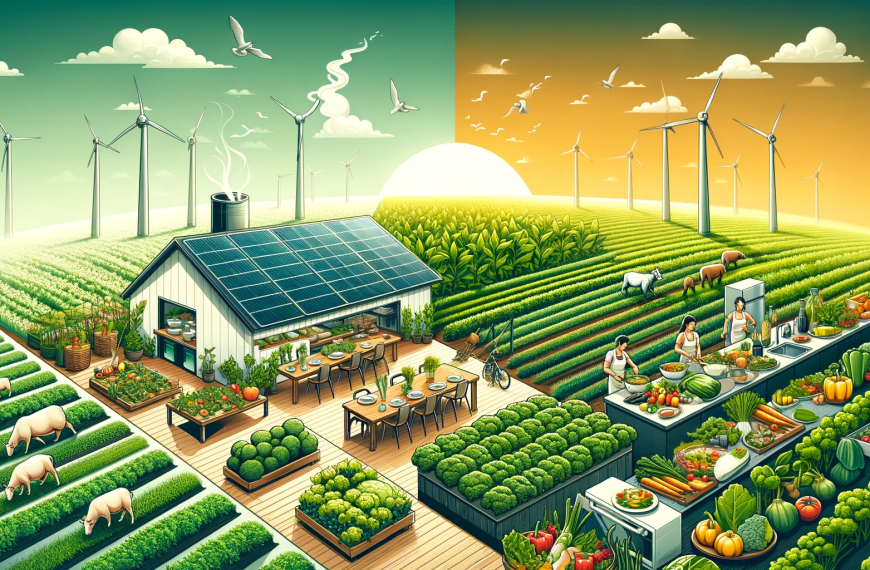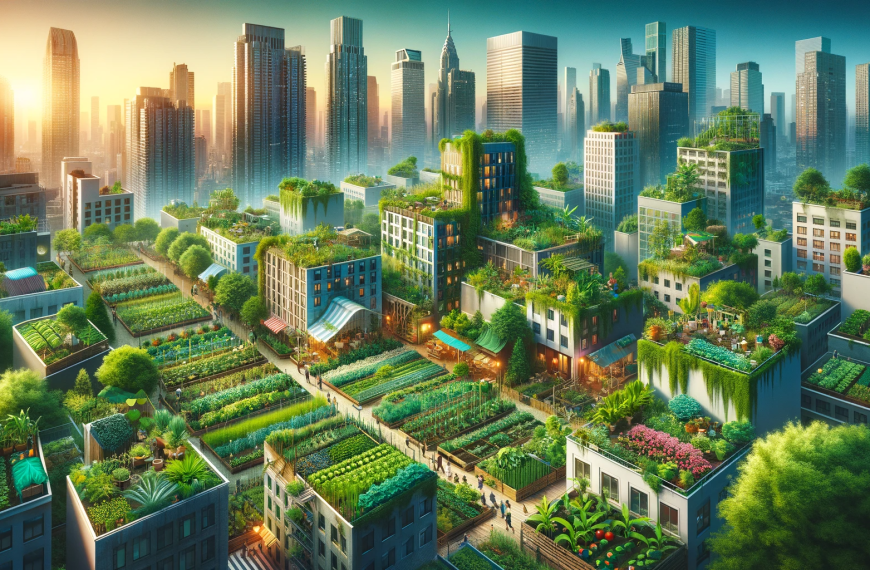At King Mongkut’s University of Technology Thonburi (KMUTT), we are deeply committed to contributing to the United Nations Sustainable Development Goal 2 (SDG 2): “End hunger, achieve food security and improved nutrition, and promote sustainable agriculture.” As a leader in science, technology, and innovation, KMUTT recognizes the critical role that sustainable agriculture and food security play in ensuring the well-being of both local and global communities. In 2024, the university continues to enhance its efforts in addressing global challenges related to hunger, nutrition, and sustainable food systems through research, partnerships, and community engagement.
Research and Innovation for Sustainable Agriculture
KMUTT is at the forefront of agricultural innovation, focusing on sustainable practices that can increase food production while minimizing environmental impact. The university’s research initiatives are designed to create technological solutions that promote sustainable agriculture, improve food security, and enhance nutritional outcomes for communities. Through a combination of precision farming technologies, agri-tech innovations, and sustainable farming practices, KMUTT researchers are developing ways to increase crop yields, reduce food waste, and make agriculture more resilient to climate change.
Through workshops, public seminars, and community outreach programs, KMUTT educates both urban and rural populations on how to access and incorporate healthy, nutritious foods into their diets, particularly focusing on local food systems that are more sustainable. The university also works closely with government agencies and non-governmental organizations (NGOs) to address issues related to food insecurity, especially in underserved areas.
Local and International Collaborations for Food Security
KMUTT recognizes that achieving food security requires collaboration at both the local and global levels. The university continues to engage in partnerships with local governments, research institutions, and international organizations to promote food security and sustainable agriculture.
In 2024, KMUTT is involved in several significant collaborations, including:
Partnerships with agricultural cooperatives: By working with local farmers and cooperatives, KMUTT helps implement sustainable farming practices that improve food security and enhance the income of rural communities.
International research collaborations: KMUTT partners with global organizations such as the research universities to share knowledge and develop solutions for sustainable food systems that benefit both developing and developed countries. Support for smallholder farmers: Through research and extension services, KMUTT provides training programs to help smallholder farmers improve their productivity, reduce post-harvest losses, and increase their income while promoting environmentally friendly farming techniques. Promoting Sustainable Food Systems on Campus KMUTT is committed to promoting sustainable food practices not only through research but also within its own campus community. The university actively encourages students and staff to adopt sustainable food choices through initiatives
Waste Reduction Programs: KMUTT implements food waste reduction strategies, including composting, promoting food waste awareness, and encouraging students to adopt zero-waste lifestyles. Community Engagement and Social Responsibility KMUTT’s commitment to ending hunger and achieving food security extends beyond the campus. The university actively engages in community-based initiatives to combat food insecurity and promote nutritional health. In 2024, KMUTT collaborates with local NGOs to support food banks and community kitchens, providing healthy meals to those in need, particularly in vulnerable populations.
Through these community initiatives, KMUTT aims to create a ripple effect of positive change, helping people understand the importance of sustainable food systems and how they can make a difference in promoting better nutrition and food security for all.
2.2 CAMPUS FOOD WASTE
1. Related information on our university as a body on measuring the amount of food waste generated from food served within the university.
KMUTT Cafeteria, tons of food are wasted including raw meat, vegetable peelings, bones and shells and leftovers dish. All of them are produced approximately 40-80 kg of food waste/day. Hence, KMUTT set up waste utilization program in organic waste to produced biogas by using food wastes from food center and canteen in the campus. The amount of 100 kg of food waste/day produces around 10 m3/day of biogas. This biogas is used for cooking and boiling water at canteen. Besides, there are also the by-product which is soil conditioner or fertilizer. These waste utilization activities reduce around 6.4% of total municipal solid waste and make high benefits from waste to energy and waste to organic farm in the campus.
In 2025, 20.42 % of organic waste are treated within our university. In 2025 KMUTT generated organic waste within our university 191,770 kg. or 34.04 % of total Municipal solid waste which compost of 129,656 kg of food waste, 62,114 kg of leaves, garden waste. The 36,000 kg. of food waste go to waste utilization process-From Waste to Energy using Anaerobic Digester for Biogas production and get fertilizer within 24 hours /batch . The 3,168 kg of garden waste go to Waste Utilizing Center to make fertilizer. The remaining 132,824 kg. of food scraps and leaf scraps are sent to government agencies because the space within the university is not enough to process the remaining organic waste. The results from organic waste treatment are biogas 3,600 m3/year and 12,264 kg /year of fertilizer as by products from biogas production: 18,000 liters /year of Liquid Fertilizer from Waste Utilizing Center. Moreover, KMUTT could reduce carbon emission to 794,048.7 kg/year CO2-e and save more than 2,785.69 USD/year according to waste management cost, LPG expenditure and fertilizer cost.

How to do “Preparing dry compost from dry leaves

Cultivation of various vegetable gardens

Making compost from small leaf and branch scraps Ratio 1 : 4
Animal feces
1. part
2. Leaves, twigs 4 parts
3. Plain water (If you have fermented water, you can mix it with water and sprinkle it)
Equipment
1. 1×3 meter net
2. 4-5 posts
3.Hammer
4. Wire
Procedure
1. Tie the net into a circle, then set up the poles around the net and tie the net to the main poles (cement pond, plastic net pond or screen pond).
2. When the pond is ready, the first layer is to be covered with 4 kg of twigs and leaves, level it out, then pour in 1 kg of animal waste, level it out, which is the first layer. Do the same thing for about 6-8 layers.
3. Water thoroughly, water every 2-3 days, leave for 2-3 months, then you will have compost to use to nourish your plants.

Distribution to personnel within the university

Management of vegetable waste from community markets within King Mongkut’s University of Technology Thonburi
KMUTT has opened the area around the parking building on the 1st floor for a community market, which is open to vendors from the surrounding community three times a week. Within the market there are shops selling food, various items, and fresh vegetable and fruit shops, resulting in approximately 4-8 kilograms of vegetable scraps left over from trimming per day.
To reduce the amount of food waste that needs to be disposed of and to promote the efficient use of resources the university has therefore initiated a method to utilize these vegetable scraps by using them as food for the geese that the university raises within the university’s own grounds. In 2025, the amount of vegetable scraps fed to geese was 372.4 kilograms.

Guidelines for managing excess food within King Mongkut’s University of Technology Thonburi
Surplus food left over from sales at KMUTT community markets and cafeterias, which occurs after the time of distribution to students and staff, is managed systematically and conscientiously. The shop owners pack leftover food in appropriate containers and place them in front of the shop after closing the shop each day. To provide an opportunity for students, housewives, gardeners and personnel who may have income limitations to come and eat free of charge. This approach, which emerged from a collaborative effort between relevant parties within the university, has been discussed with community markets and vendors to find ways to manage surplus food that is still of high quality and safe to consume. As a result of these discussions and exchanges of ideas, many entrepreneurs expressed their willingness to participate in supporting this approach It is believed that sharing excess food not only reduces food waste but also helps alleviate the burden on those who may be facing financial hardship. This is in line with the university’s sustainable development guidelines and fosters a sharing society within the university community.


To achieve the KMUTT university policy, municipal solid waste (MSW) management system has been developed since 2002. The system consists of the three main parts: waste segregation, waste collection and waste utilization. Organic waste, recycled waste, non-recycled waste, toxic waste and workshop waste are generated within campus. The system is continuously developing through various activities such as exhibition and training program, which occur 5 times per year. The chart below provides information on the rate of municipal solid waste generation in kilograms/capita-year. Most recently, the generation rate of municipal solid waste, Garden waste, was 35.84 kilograms/capita-year in early 2006. At 31.04 kilograms/person per year, in 2025 it may be reduced by 13.38 %.
KMUTT Municipal solid wastes in 2025

This infographic presents the composition of municipal solid waste in five main categories. The largest portion is non-recycled waste, which accounts for 39.94% (225,092 kg). Organic waste comes next at 34.04% (191,770 kg), followed by recycled or reused waste at 20.39% (114,891 kg). Non-recycled workshop waste constitutes 5.03% (28,339 kg), while toxic waste makes up the smallest share at 0.61% (3,453 kg).
The visual summary with color-coded icons clearly illustrates how most waste remains non-recycled, but there is also a notable amount of organic and recycled material. Overall, this snapshot highlights opportunities for improvement in recycling and organic waste management.

This infographic displays the breakdown of recycled wastes deposited at the recycle waste bank, divided into four main material types. Paper makes up the largest share at 50.14% (57,449 kg). Metal is the second largest category at 27.22% (31,215 kg), followed by plastic at 17.25% (19,780 kg). Glass comprises the smallest proportion, accounting for 5.39% (6,184 kg).
This summary highlights that paper and metal are the primary recycled materials by weight, while glass and plastic contribute a smaller but still significant portion to the total recycled waste.
Campus population
KMUTT has a total population of 18,153 people, divided into 15,500 students and 2,653 personnel. If it is taken to calculate waste, KMUTT’s population creates food waste at 31.04 Kg/person/year.
Student statistics
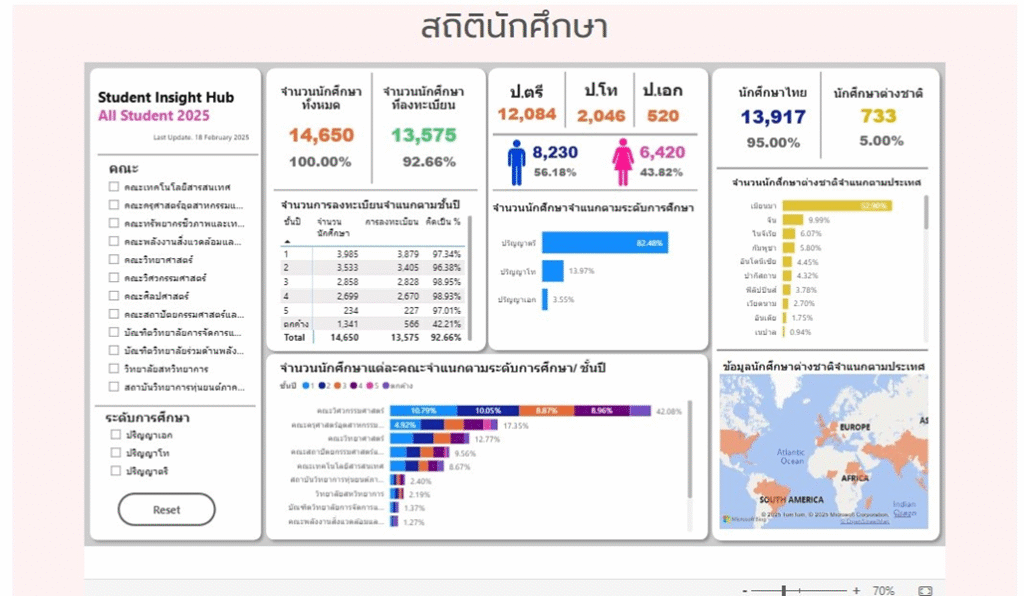
Personnel statistics

2.3 STUDENT HUNGER
1. Related information on our university as a body on having a programmer in place on student food insecurity/hunger.
Inside KMUTT
KMUTT has a project to create food security for students, personnel, and communities for well-being. Good food for students, personnel, and areas responsible for the target group by personnel and students to assist in the operation and practice skills/experience by adhering to the philosophy of sufficiency economy The area is allocated according to the activities that occur. Part 1 Organic vegetable gardening in the student dormitory area. so that students or staff can eat. Part 2 Organic vegetable gardening. To trade for personnel within and the community by using fertilizer from the leaves and branches in the university to compost as fertilizer for the cultivation of such vegetable gardens.

King Mongkut’s University of Technology Thonburi arranged a selection of restaurants and shops serving within the university with criteria such as healthy food, vegetarian food, and environmentally friendly packaging. Both restaurants and beverages on campus were also enforced to use raw materials that can be found locally.


KMUTT is always ready to stand by and support our students.
Following the earthquake in Myanmar on March 28, 2025, which caused widespread impact and damage to life and property, the university expresses its deepest condolences to all victims and those who have suffered losses.
The university is concerned about students and their families who may have been affected by this disaster, whether it be impacts on the family’s income and livelihood, or obstacles to the student’s education.To provide assistance and alleviate hardship, the university has established guidelines to help affected students.

KMUTT has distributed soy milk to staff and students who bring their own cups on the 1st floor of the Learning Commons (LX) building.

KMUTT has a free soft drink service point for students who bring their own containers. This is held twice a month throughout the academic year.

2. Related information on our university as a body on providing interventions to target hunger among students and staff.
KMUTT has a lunch program for students in need. with kind-hearted adults giving lunch funds to the students

KMUTT during the examination period Students will find a place to read books and study for exams. KMUTT will open the building for students to read books and study for exams. Snacks will be prepared in the building. Instant noodles, bread, hot milk, and drinks are provided for students to eat while studying and studying for exams by these foods and drinks Receive support from kind adults.



Outside KMUTT
KMUTT delivers donated items to help disaster victims, round 2
On September 25, 2024, Student Financial Aid Working Group Delivering donated items for the project “KMUTT joins together to help flood victims” with Ms. Panadda Puangpee, head of the work group. Representing the project to give items to Thailand Post Company Limited. Under the project “Thailand Post connects kindness” Delivered to Flood Victims” to be delivered to flood victims according to the next project objective.
The organizers of the project would like to thank students, staff, and the general public for donating to the victims. The project will be accepting donations until September 30, 2024. Donations can be made on the 1st floor of the President’s Office Building (N2). By requesting an announcement to refrain from accepting second-hand clothing items. But we are also accepting items such as dry food and medicine that have not expired. and cleaning equipment

KMUTT is always ready to stand by and support our students.
Following the earthquake in Myanmar on March 28, 2025, which caused widespread impact and damage to life and property, the university expresses its deepest condolences to all victims and those who have suffered losses.
The university is concerned about students and their families who may have been affected by this disaster, whether it be impacts on the family’s income and livelihood, or obstacles to the student’s education.To provide assistance and alleviate hardship, the university has established guidelines to help affected students.

KMUTT has distributed soy milk to staff and students who bring their own cups on the 1st floor of the Learning Commons (LX) building.

3. Related information on our university as a body on providing sustainable food choices for all on campus, including vegetarian and vegan food.
KMUTT started selling healthy food and developing a safe food system within the university since 2010 with rules for selecting restaurants. In 2021, there are shops selling healthy food. vegetarian food and vegetarian food produced from local and domestic raw materials In all 4 canteens of KMUTT, including food for students Islamic personnel who do not eat pork And can also choose the amount of food as follows. Size S , M , L , XL according to the needs of consumers to reduce the amount of food waste that occurs in the university.

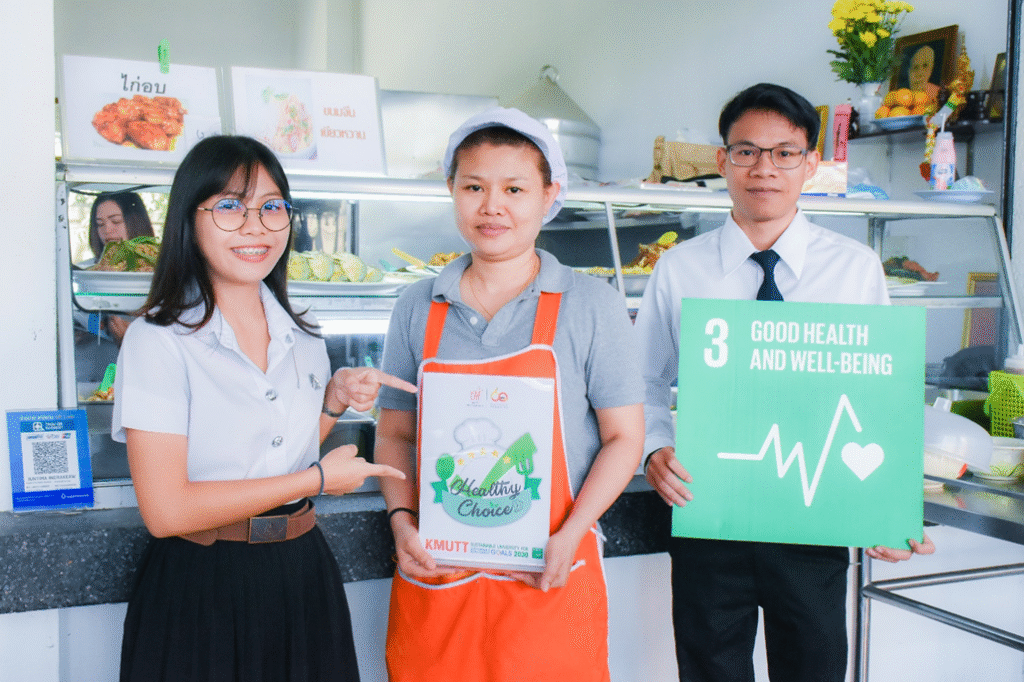
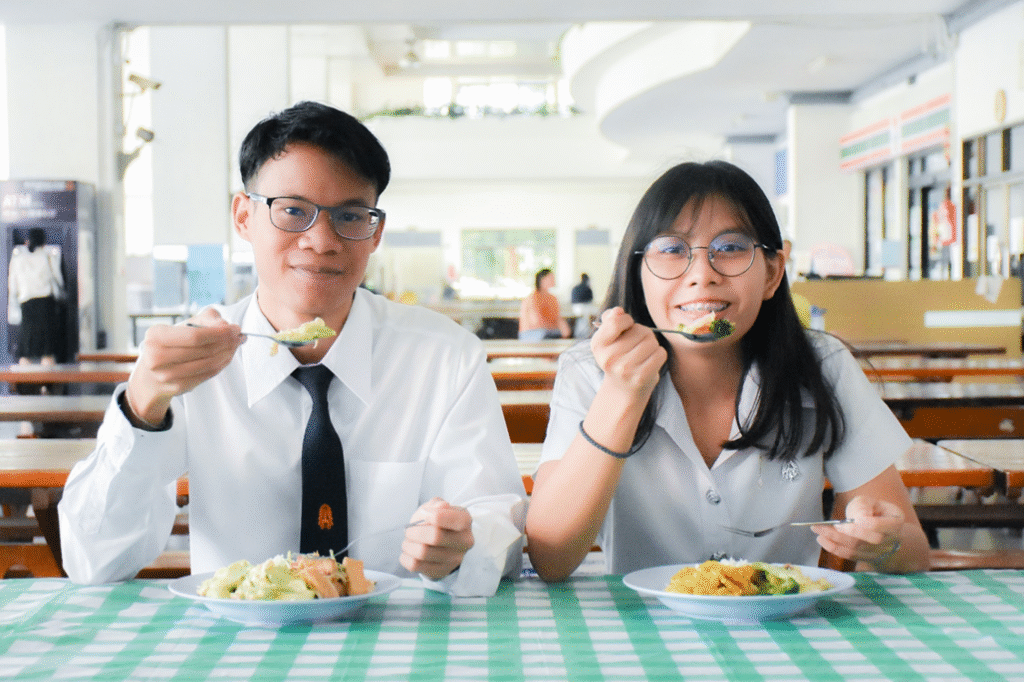
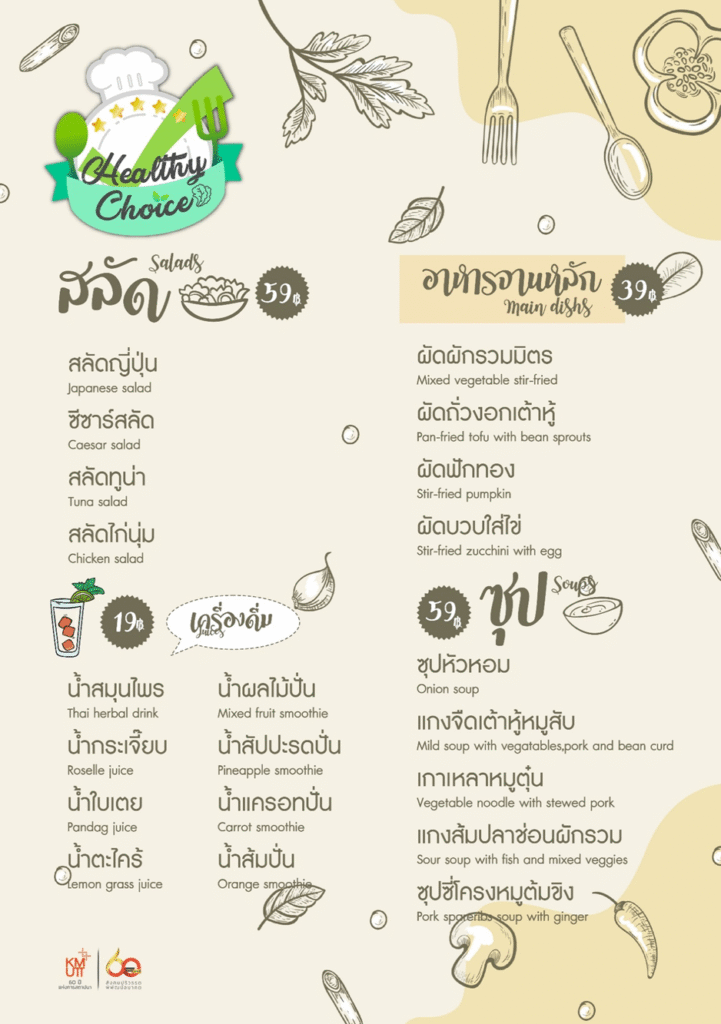
KMUTT has a restaurant for sale to students. Various types of personnel, such as vegetarian food, vegetarian food, healthy food, and others, to be an option and suitable for each person’s diet. The shops are available at food distribution points throughout the university. And the raw materials used for cooking are seasonal plants, vegetables, and fruits. and purchase objects from local farmers.



Restaurant service point King Mongkut’s University of Technology Thonburi




One Young Come is located on the ground floor of the 14-story parking building of King Mongkut’s University of Technology Thonburi. It is a restaurant that is an option for health-conscious consumers and vegetarians.


KMUTT’s traveling flea market is open every day, Wednesday – Thursday, providing another option for consumers. Whether it’s food or supplies, it’s located on the ground floor of the 14-story parking building of King Mongkut’s University of Technology Thonburi.

KMUTT has a drinking water dispenser. There are 16 automatic food vans available 24 hours a day throughout the university for students and staff who work late and study during exams. For the convenience of all students and staff in finding food to eat.
KMUTT invites staff to balance their diet for better health in 21 days.
King Mongkut’s University of Technology Thonburi (KMUTT), through its Health Care Unit, launched the challenge activity “KMUTT Healthy Balance Diet 2025: Eat Well, Stay Healthy in 21 Days” with great enthusiasm on May 6, 2025, at the Self-Learning Room, LX Building. The event attracted 46 staff members from various university departments who signed up to participate.
The goal of this initiative is to promote knowledge and understanding of proper nutritional practices, encouraging staff to adopt balanced eating behaviors as role models for healthy living. The program featured expert speakers from the Balanced Diet for Health Project of the Thai Health Promotion Foundation (ThaiHealth), who delivered insightful talks on topics such as “The Secret Code of the Healthy Plate and Food Exchange Groups (Cut Sugar, Fat, Salt, and Boost Fruit & Vegetable Intake)” and “Reading Nutrition Labels for Smarter Eating.”
Participants also engaged in various skill-building activities, including workshops on reducing salt and sugar intake, making “5 Food Groups in 1 Glass” drinks, vegetable weighing games, practicing plate portioning based on the 2:1:1 principle, and quiz competitions with prizes. The activity aligns with Sustainable Development Goal (SDG) 3, focusing on good health and well-being. The “KMUTT Healthy Balance Diet 2025” challenge is one of KMUTT’s key initiatives, reflecting the university’s commitment to comprehensive staff wellness and the promotion of a sustainable culture of good health.’


KMUTT has a campaign to encourage people to bring their own food containers to receive discounts on food and to reduce plastic use.

4. Related information on our university as a body on providing healthy and affordable food choices for all on campus.
KMUTT selected menus from various restaurants in order to provide the benefit for students and personnel by giving labels and selecting alternative healthy menus, being available in every store of KMUTT.

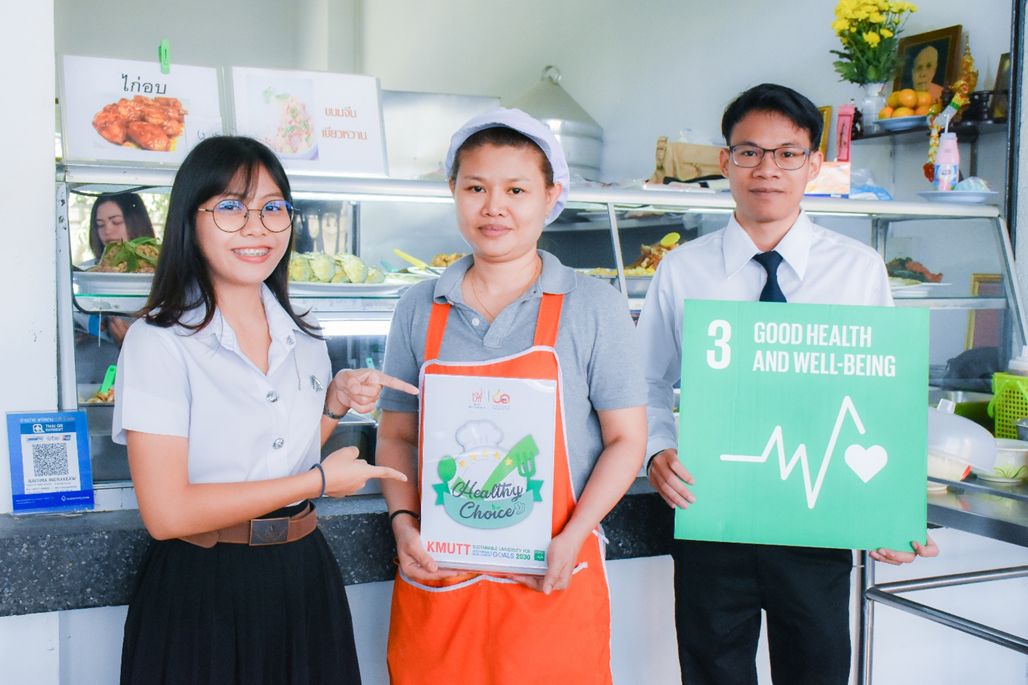


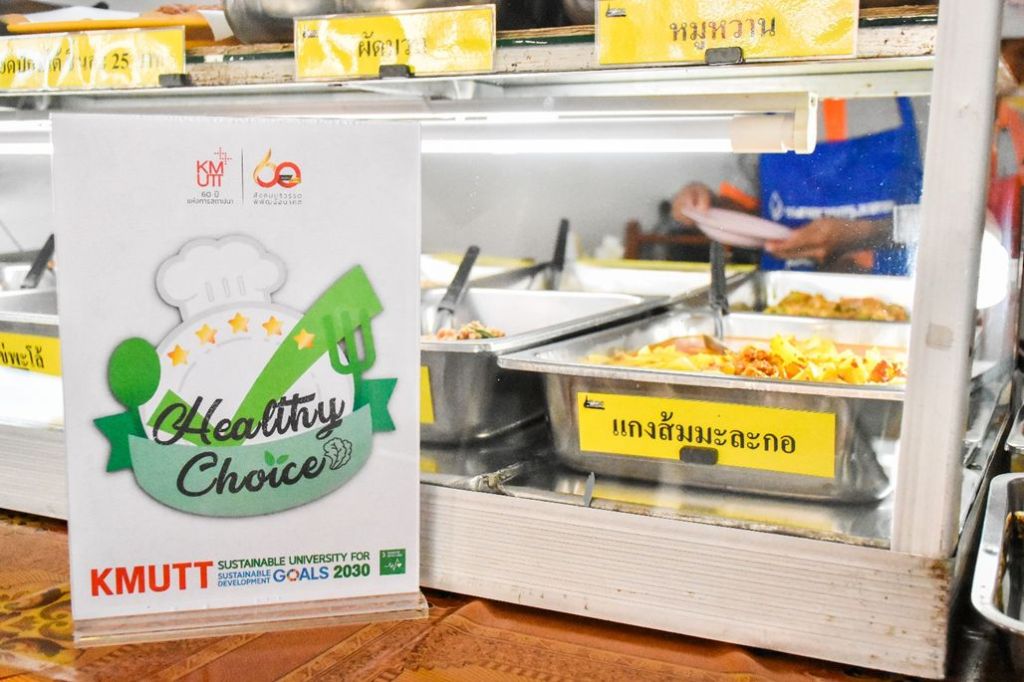
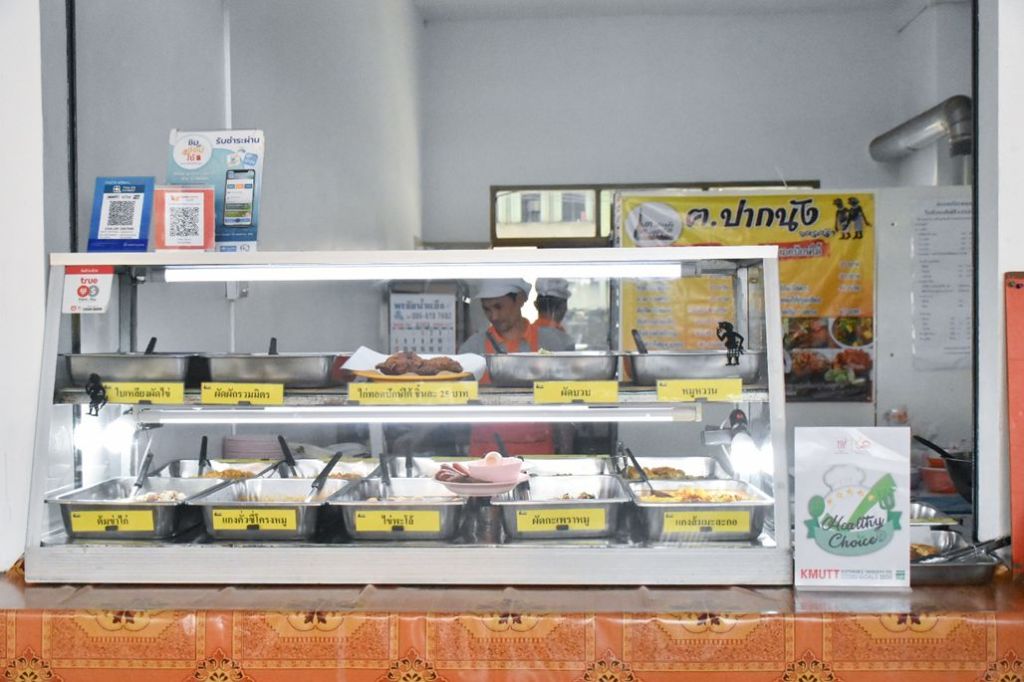
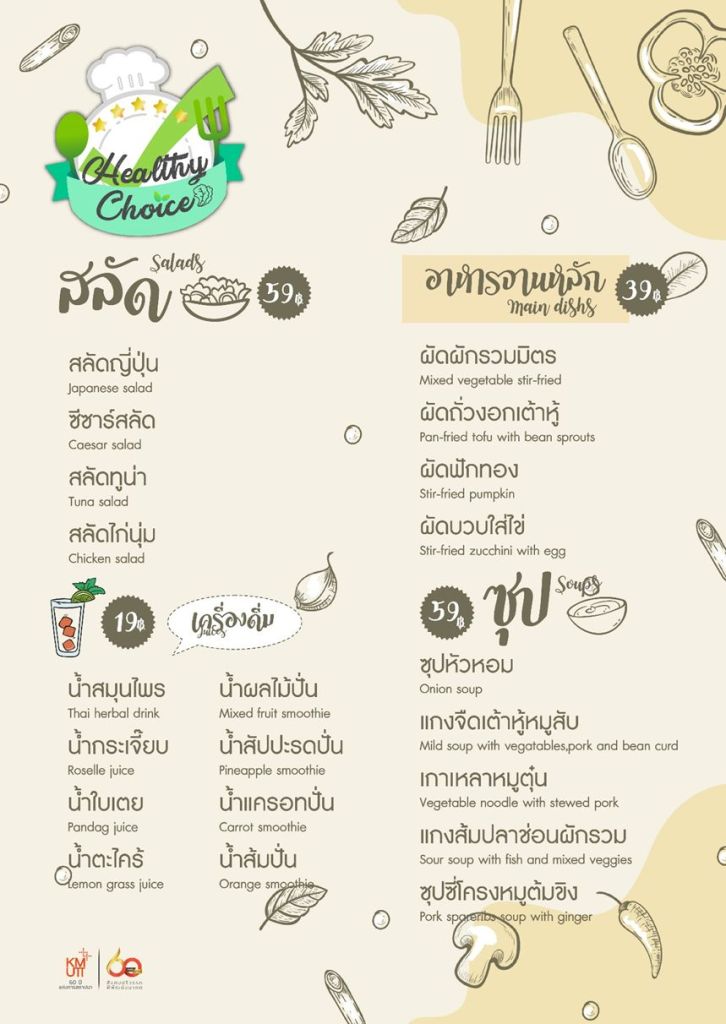
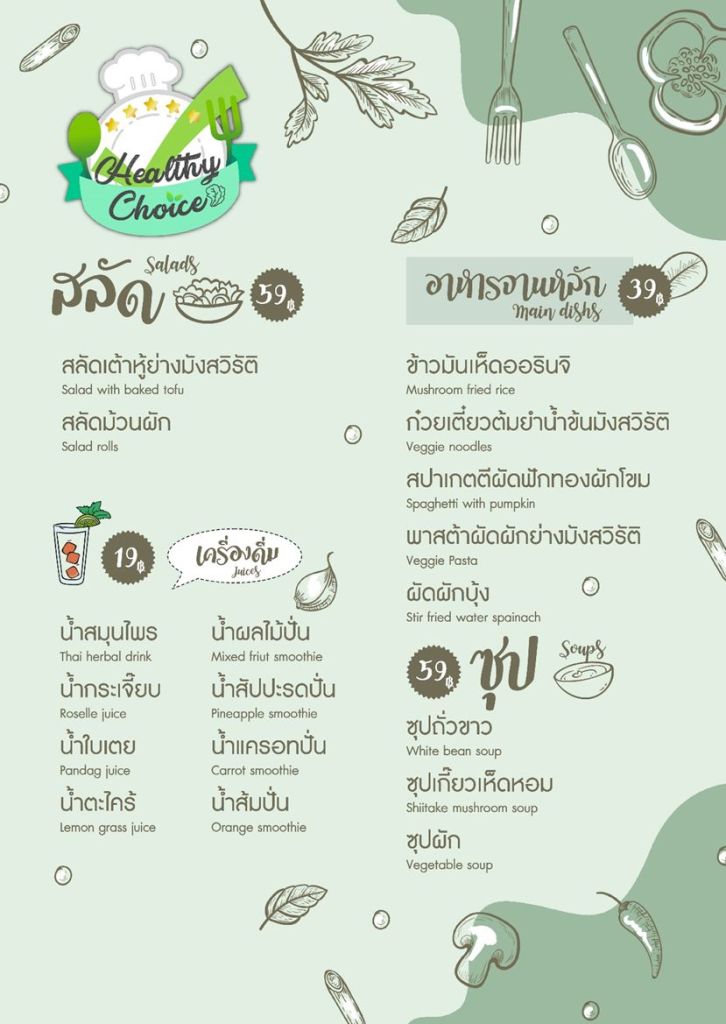
KMUTT has a community shop. Selling a variety of drinks and healthy food at inexpensive prices that local people come to sell to students and staff.
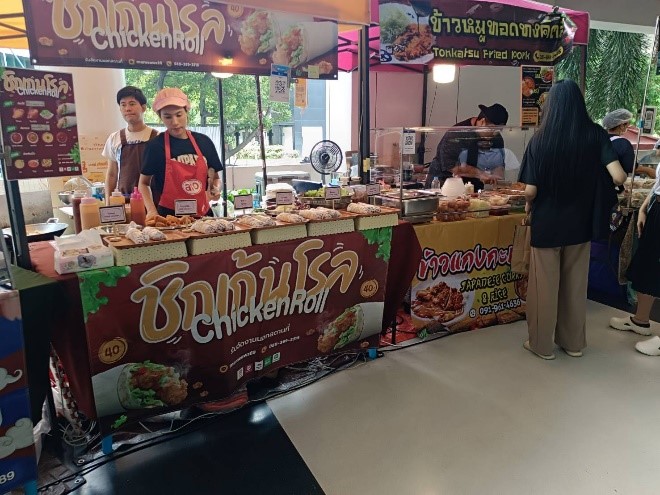
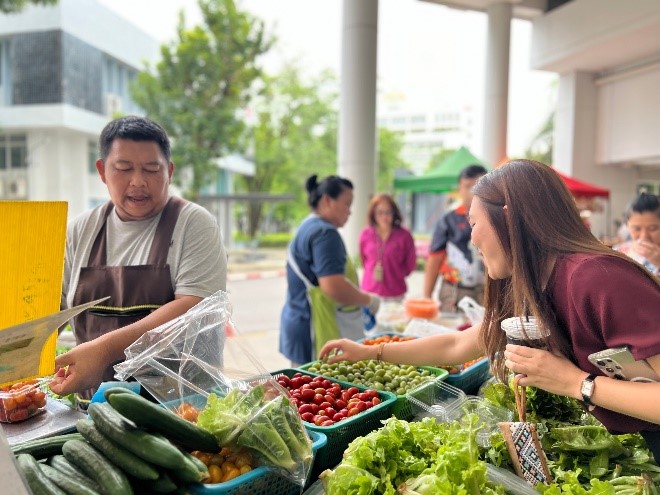
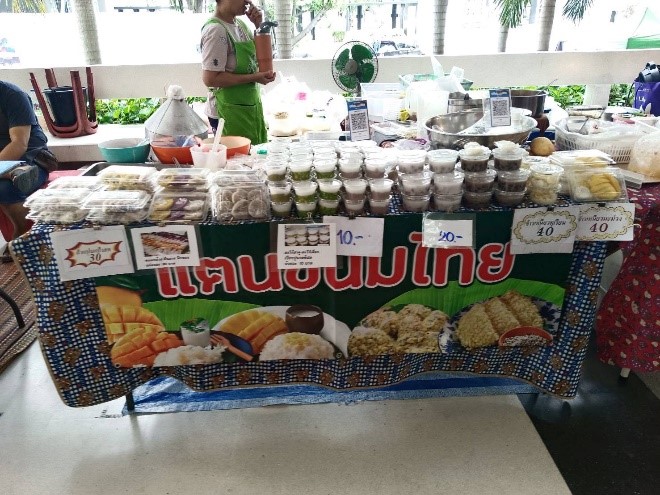
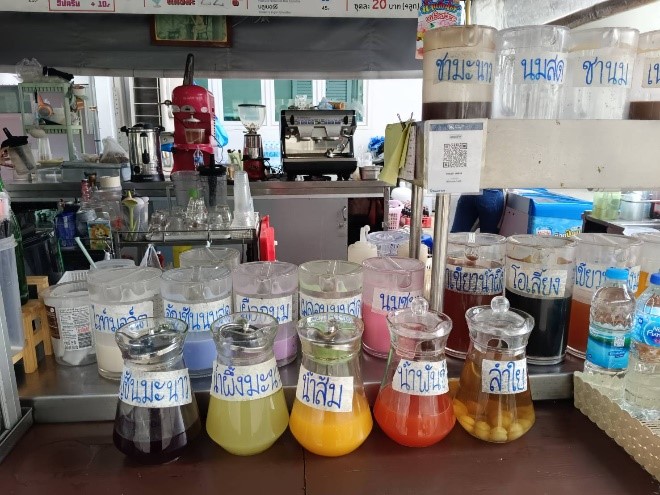
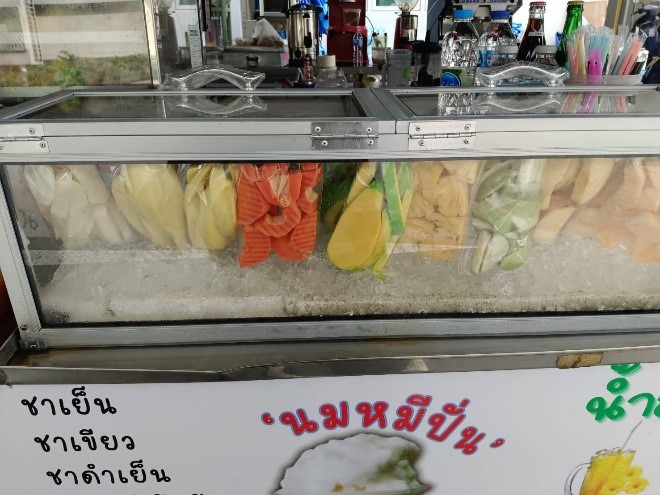
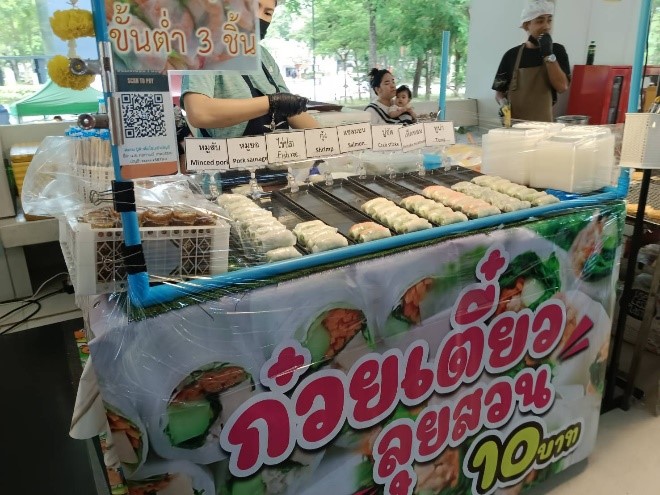
KMUTT has a campaign to encourage people to bring their own food containers to receive discounts on food and to reduce plastic use.

KMUTT invites staff to balance their diet for better health in 21 days.
King Mongkut’s University of Technology Thonburi (KMUTT), through its Health Care Unit, launched the challenge activity “KMUTT Healthy Balance Diet 2025: Eat Well, Stay Healthy in 21 Days” with great enthusiasm on May 6, 2025, at the Self-Learning Room, LX Building. The event attracted 46 staff members from various university departments who signed up to participate.
The goal of this initiative is to promote knowledge and understanding of proper nutritional practices, encouraging staff to adopt balanced eating behaviors as role models for healthy living. The program featured expert speakers from the Balanced Diet for Health Project of the Thai Health Promotion Foundation (ThaiHealth), who delivered insightful talks on topics such as “The Secret Code of the Healthy Plate and Food Exchange Groups (Cut Sugar, Fat, Salt, and Boost Fruit & Vegetable Intake)” and “Reading Nutrition Labels for Smarter Eating.”
Participants also engaged in various skill-building activities, including workshops on reducing salt and sugar intake, making “5 Food Groups in 1 Glass” drinks, vegetable weighing games, practicing plate portioning based on the 2:1:1 principle, and quiz competitions with prizes. The activity aligns with Sustainable Development Goal (SDG) 3, focusing on good health and well-being. The “KMUTT Healthy Balance Diet 2025” challenge is one of KMUTT’s key initiatives, reflecting the university’s commitment to comprehensive staff wellness and the promotion of a sustainable culture of good health.’

5. Staff hunger interventions
KMUTT has a project to create food security for students, personnel, and communities for well-being. Good food for students, personnel, and areas responsible for the target group by personnel and students to assist in the operation and practice skills/experience by adhering to the philosophy of sufficiency economy The area is allocated according to the activities that occur. Part 1 Organic vegetable gardening in the student dormitory area. so that students or staff can eat. Part 2 Organic vegetable gardening. To trade for personnel within and the community by using fertilizer from the leaves and branches in the university to compost as fertilizer for the cultivation of such vegetable gardens.

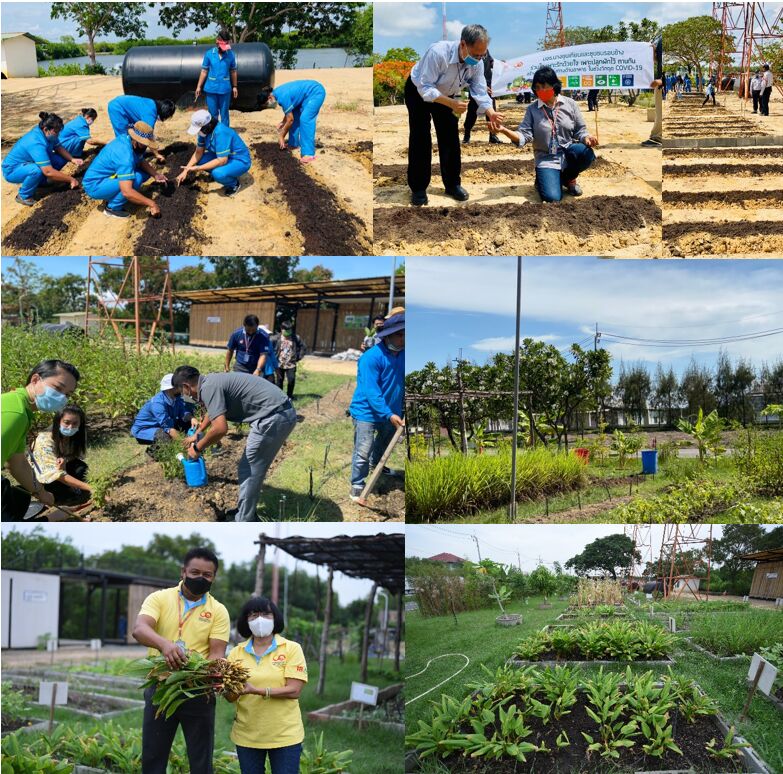
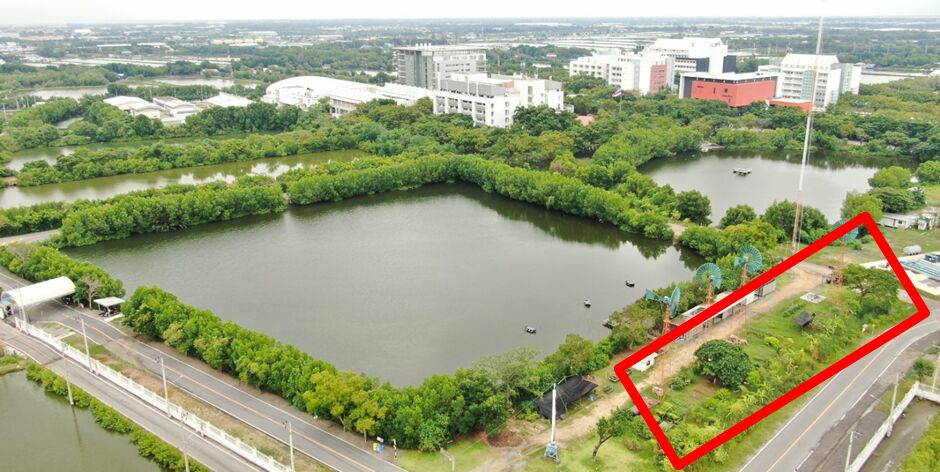
Cultivation of various vegetable gardens by starting to plant water spinach, lettuce, fairy mushroom,Guangdong
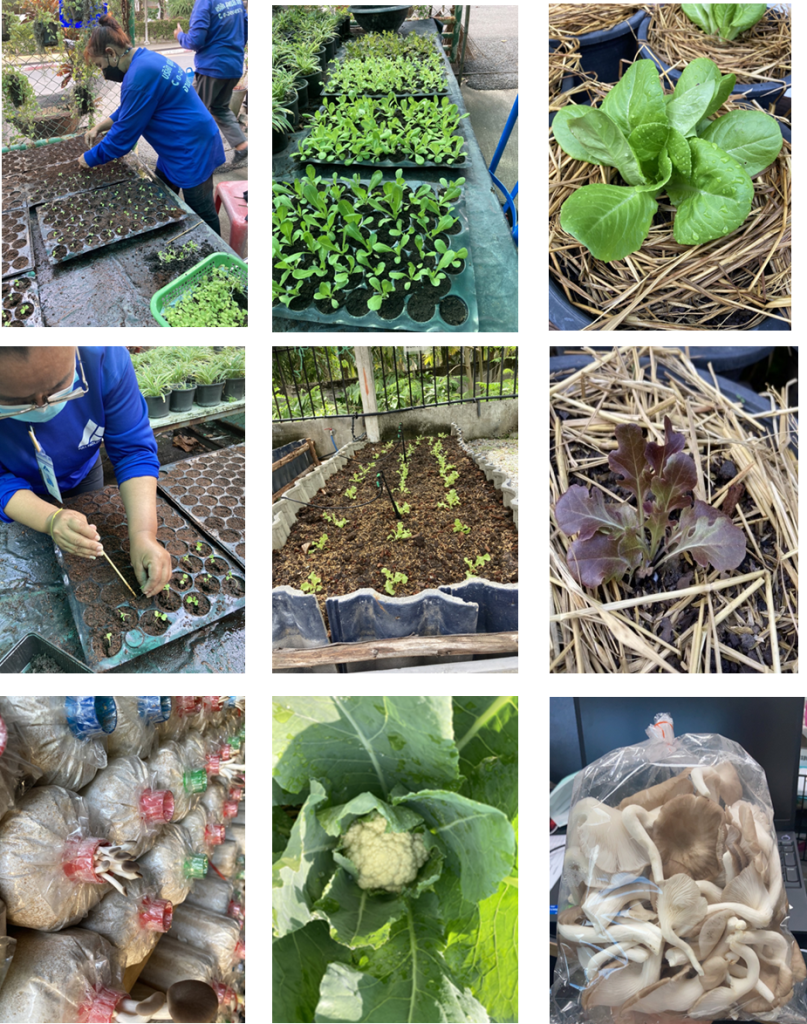
Distribution to personnel within the university.
The yield from the cultivation of vegetables in the kitchen garden is more than 200 kg.
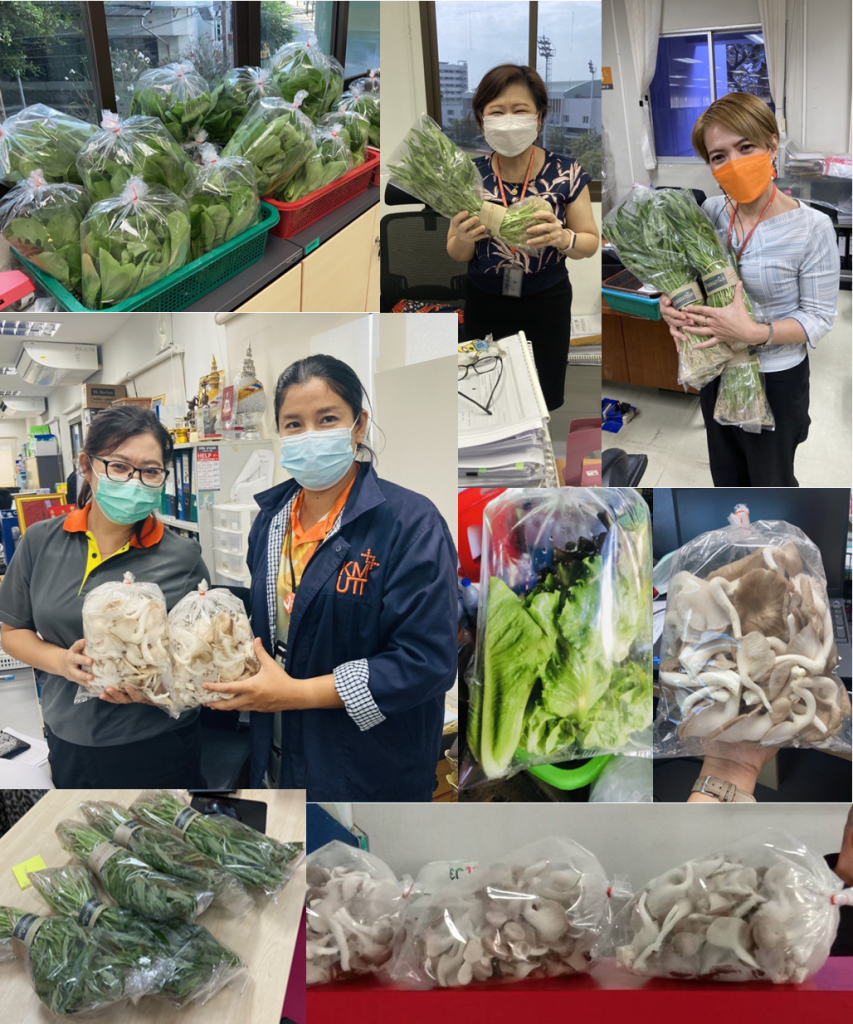
KMUTT organizes activities on important days such as Environment Day. Therefore, we ask for the housekeeper’s cooperation to help collect garbage within the university. After finishing the activity, vegetable seedlings were distributed to be planted, reducing costs from buying vegetables from the market.
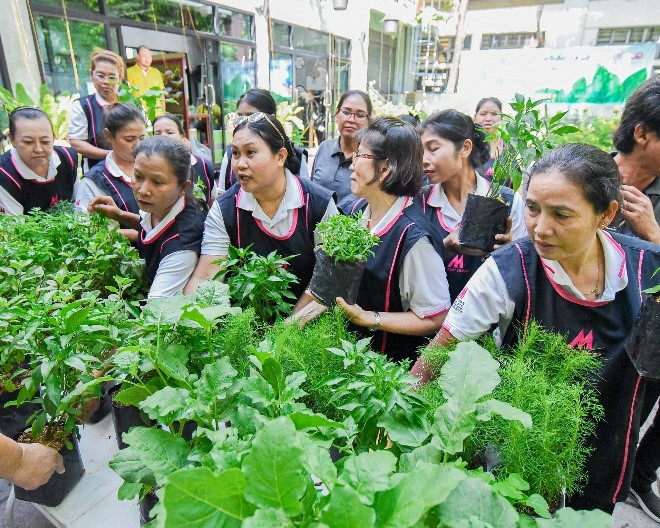
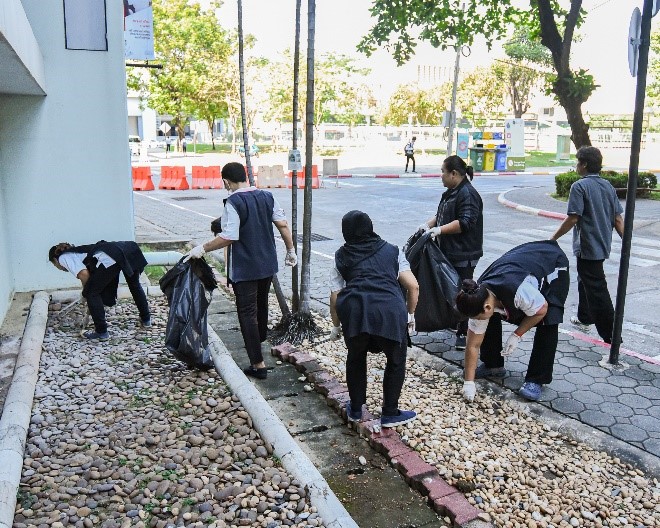
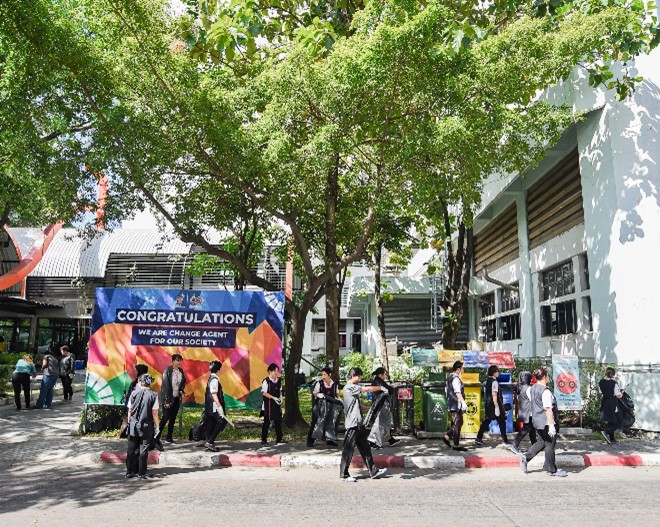
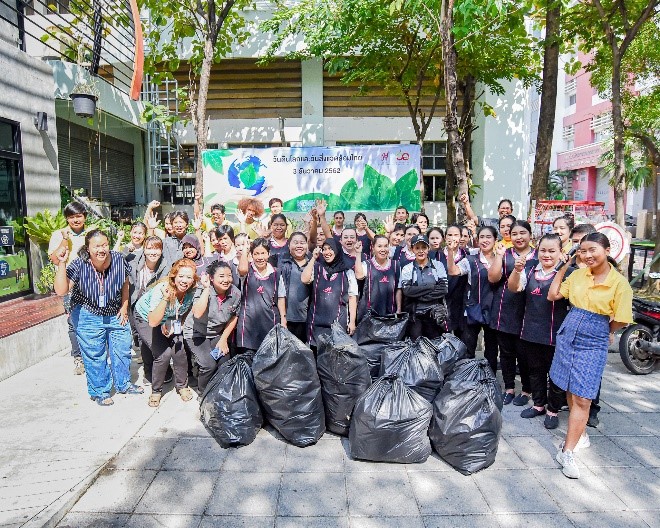
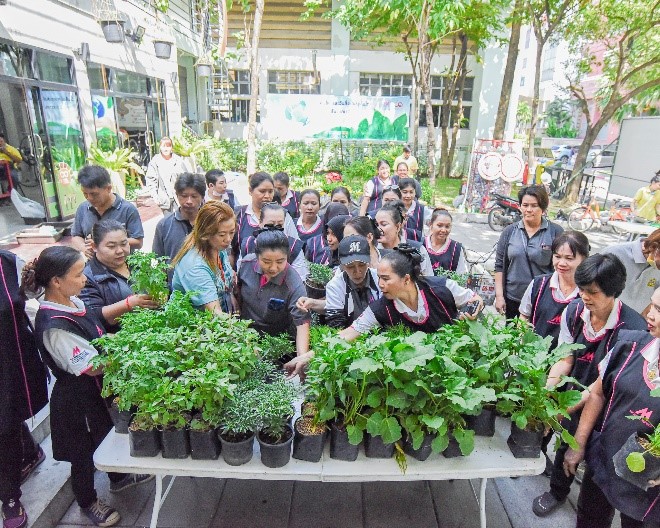
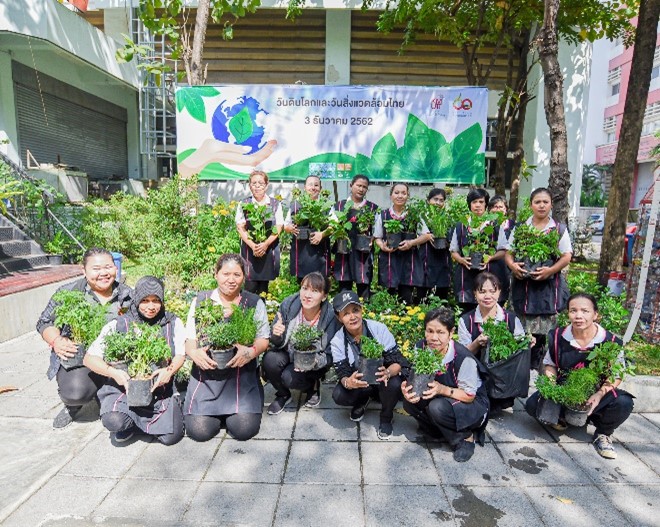
On November 25, 2024, King Mongkut’s University of Technology Thonburi, in collaboration with Betagro Public Company Limited, organized a workshop on “Growing Organic Salad Vegetables on Tiles for the Disabled”.

On September 25, 2024, Student Financial Aid Working Group Delivering donated items for the project “KMUTT joins together to help flood victims” with Ms. Panadda Puangpee, head of the work group. Representing the project to give items to Thailand Post Company Limited. Under the project “Thailand Post connects kindness” Delivered to Flood Victims” to be delivered to flood victims according to the next project objective.
The organizers of the project would like to thank students, staff, and the general public for donating to the victims. The project will be accepting donations until September 30, 2024. Donations can be made on the 1st floor of the President’s Office Building (N2). By requesting an announcement to refrain from accepting second-hand clothing items. But we are also accepting items such as dry food and medicine that have not expired. and cleaning equipment

KMUTT is always ready to stand by and support our students.
Following the earthquake in Myanmar on March 28, 2025, which caused widespread impact and damage to life and property, the university expresses its deepest condolences to all victims and those who have suffered losses.
The university is concerned about students and their families who may have been affected by this disaster, whether it be impacts on the family’s income and livelihood, or obstacles to the student’s education.To provide assistance and alleviate hardship, the university has established guidelines to help affected students.

KMUTT has distributed soy milk to staff and students who bring their own cups on the 1st floor of the Learning Commons (LX) building.

2.5 NATIONAL HUNGER
1. Related information on our university as a body providing access on food security and sustainable agriculture knowledge/skills/technology to local farmers and food producers.

KMUTT carries out research missions and utilizes research results to create a knowledge-based society along with sustainable development. bring benefits to the academic dimension Public society and community building for economic strength In the form of a university-community and society project in an area-based mission, which gives importance to the development of a designated area in an integrated way. In order to create the benefits of the area and communities around the university’s study areas, consisting of Thung Khru, Rat Burana, Bang Khun Thian, Ratchaburi Province western region of the country and in other areas across the country, the results of operations in fiscal year 2021 are as follows:
“University Project with Community and Society Thung Khru, Rat Burana, Chom Thong and Bang Khun Thian area
Emphasis on research and academic services on agricultural technology development, community-based tourism support Conservation and management of local resources for a wide range of target groups. Center for Research and Academic Service for Community and Society (NRCTImplemented the “Bangmod Oranges in Containers Technology Transfer Project to Support Community-Based Tourism” to transfer technology on Bangmod oranges in containers to support community-based tourism. Conservation and restoration of Bangmod oranges target group namely Kampong Tourism Group in Dong Prue Bangmod Orange Conservation and Restoration Group and the Bangmod Canal Community Tourism Group and more than 200 interested people organized a test boat trip to travel and learn about the Khlong Bangmod community for 87 people. It can be said that “Som Bangmod” is still the identity of the community. able to attract and create interest for tourists as well.
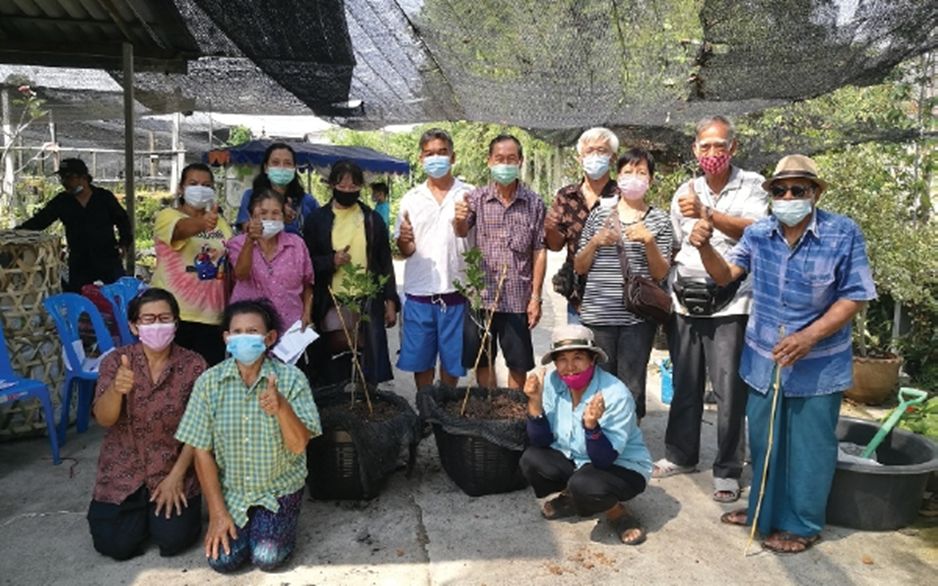
However, in the context of the community, there is an integrated garden and vegetable planting. Researchers and 3rd year students from the Department of Electrical Engineering Visit the vegetable plot (Soi Phuttha Bucha 39), an area of 3 rai, to learn and collect planting and care information, install a data logger, and record it on a Google Sheet in real-time by applying Internet of Things (IOT) technology and renewable energy from solar cells help students develop academic skills. On the social laboratory area (Social Lab)

Thonburi side has the context of the waterfront area. green area The way of life of people in urban communities who still use the canal route for travel. and engaged in agriculture But when the growth and the construction of more roads caused the canal to reduce its role. Faculty of Architecture, Faculty of Science and both domestic and international networks to conduct a “Thonburi canal route survey project” in 4 pilot districts (Thung Khru, Chom Thong, Thon Buri, Klong San) to study the water quality of the canal. Environmental quality, wind power and PM2.5 dust, including the potential of the riverside community. Hope to connect the transportation routes with the BTS Skytrain and the Metropolitan Rapid Transit (MRT) to create maximum benefits for the community and tourists.
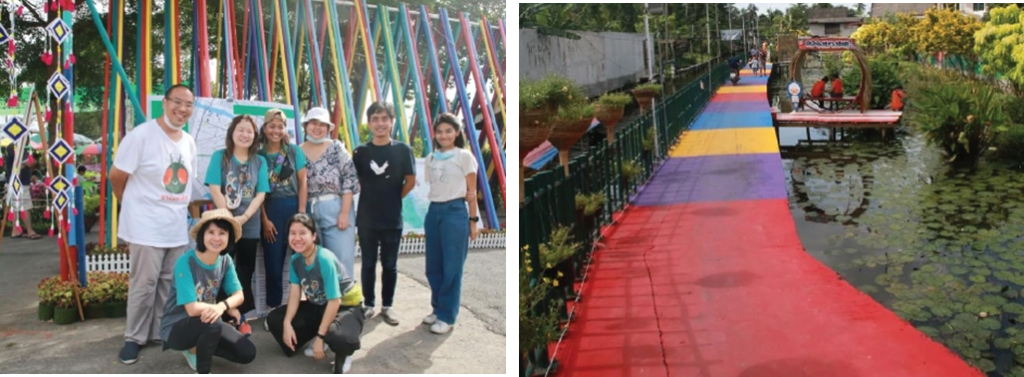
The SAFETIST FARM group is a group of new generations with the idea of creating a learning center and community innovation. Non-toxic agriculture coupled with tourism Located in Soi Pracha Uthit 76 Intersection 9 next to Bangmod Canal, using 3-4 rai of land as a vegetable plot. Raising good-humored chickens, fish ponds, house for breeding striped fly worms Nature learning activities for children-youths and families The faculty and staff of the university went on a study visit. Including discussing ways and possibilities to develop sustainable cooperation and learn together. Later supported Honda electric motorcycles to borrow and use. The work in experimenting with a non-toxic vegetable delivery system and reducing pollution creates a new career “Veggie Delivery”, delivering vegetables within a radius of 5 – 10 kilometers from the farm.

As part of the implementation of the project under the One Tambon One University (U2T) project, the Faculty of Arts cooperates with STECO, Thung Khru District Office. and Public Health Service Center 54 Tas-Iam, implementing the “Economic and Environment Rehabilitation Project Linked to Bangmod Canal Tourism” consisting of 1) Training on the production of eco-friendly fermentation tanks. Delivered 312 fermentation tanks to the community 2 to educate waste management Through the radio program FM 95.25 “Keep it up and tell it. Talk it up” 12 episodes and 3) Entrepreneur competency development in online training format, i.e. basic entrepreneurship, online marketing, communication techniques and product presentation. after birth training “Entrepreneur Competency Development Network Group (Workers)” various works For example, publications such as 1) Bangmod highlights, community tours, 2) cycling routes @Bangmod and eating and traveling in various styles of Bangmod, 3) books to support tourism. and preserving local wisdom such as “Here…Bangmod” and “Turn the rice field into an orange orchard” and 4) website by importing information to the website https://sola.pr.kmutt.ac.th/bangmod/
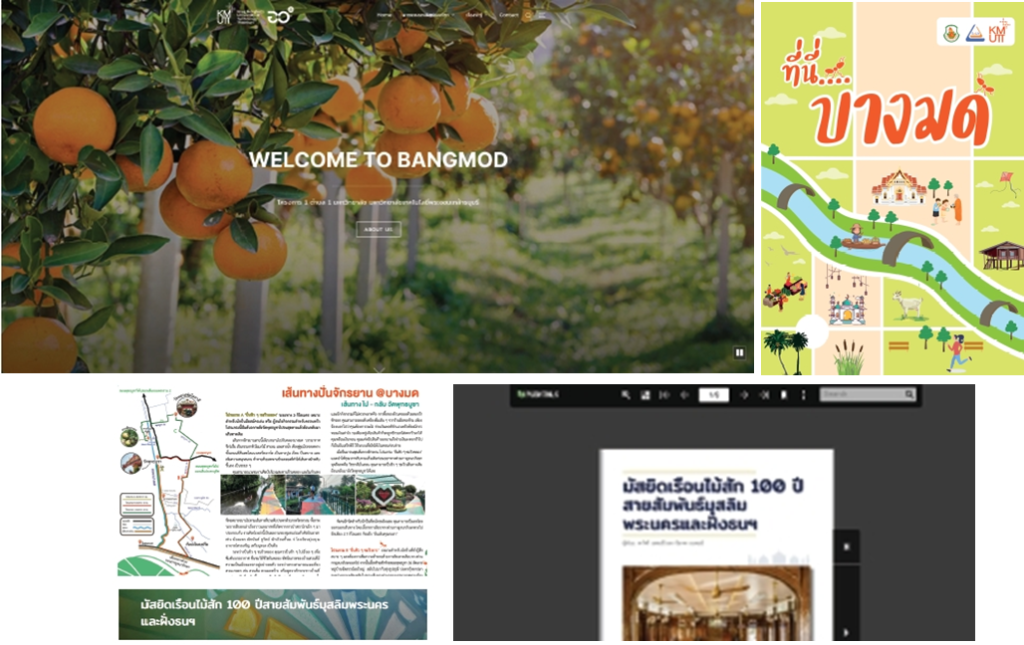
“Training Project – Apprenticeship for Disabled Persons To prepare for work in the workplace, Class 8” by the joint working group of RSC/SorPor. NESDB and NESDB. Funds are supported by 4 public and private enterprises, with people with disabilities participating. Project 55 lecturers, students, KMUTT personnel and 59 guest speakers organize training courses 1) Office staff 2) Media production course digital publications and 3 local handicraft product development courses Training on content design and use of activities for learning (Activities Base Learning), an online learning format and using the Moodle system (E-Learning) for the third course, was conducted in collaboration with Ban Nangoy-Phon Community Enterprise Learning Center. Pla Lo, Sakon Nakhon Province Create 2 product brands, namely “Do” and “Yay Di”, generating about 3.4 million baht in revenue. At the end of the project, 8 people with disabilities get jobs in the workplace, 2 freelancers, and 10 people continue their education/vocational training. during tracking
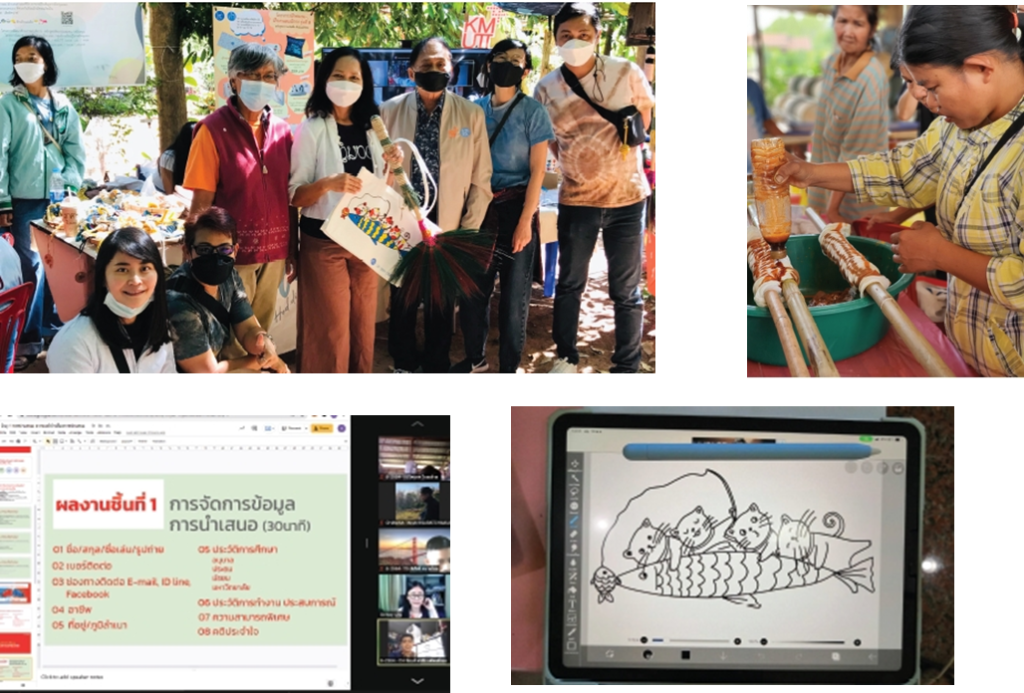
Ratchaburi Province western region of the country and in other areas across the country
“The application of solar electric fence technology for raising animals”
With farmers in Rang Bua Sub-district, Chom Bueng District, Ratchaburi Province, using wire as an electric fence to be attached to a car battery to keep pets in the grazing area which is far from the community and the power transmission line cannot reach Therefore, the battery must be brought back to charge the electricity at the house on average 2-3 days / time. The joint working group of RSC / SorPor. in battery Applies to “electric fences” and other electric devices. Facilitates farmers Help reduce the average energy cost per year 2,500 baht/household and promote the use of clean energy that is environmentally friendly Performance consists of 1) 119 farmers passed the training 2) Collaboration network from 7 professors/personnel of KMUTT and 3) Learning center for solar power generation systems for agriculture to be a place for study visits/expansion of technology on clean energy application according to the new agricultural theory
“Application of drip irrigation technology project for vegetable gardening with solar energy”
Most areas in Rang Bua Subdistrict are sandy loam soils that do not absorb water. Outside in the irrigated area, the agricultural way of life relies mainly on rainwater. And the problem of water shortage every year, the joint working group RSC/SorPor Along with installing an automatic plant watering control system via smartphone as a result, it can save water and use water more efficiently for plants. Reduce the cost of fuel pumping (12,000 baht/household) reducing the impact on the environment. Reduce working time and agricultural labor The important thing is that farmers can cultivate and generate income all year round. (After paddy fields during the dry season, the average annual income increased by 5,000 baht/household). 1) 27 farmers passed the training, 2) a network of cooperation from 7 KMUTT teachers/personnel and 3 KMUTT students, and 3) a learning center for solar power generation systems for agriculture. for study visits/expansion of technology at 3 places
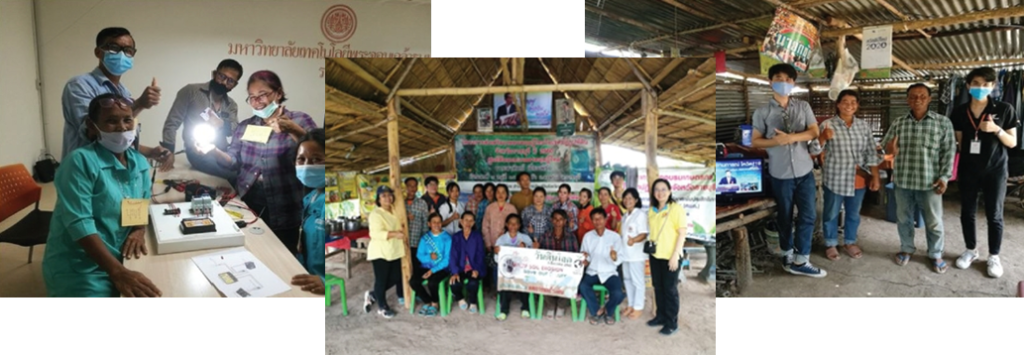
“Technology transfer project for the processing of agricultural products”
Radish products According to food safety standards and increasing production efficiency with turnip thresher: Community Enterprise Group Ratchaburi Province, lettuce or radish is grown the most in the western region (Ratchaburi, Phetchaburi, Ban Kha Lettuce Producer Community Enterprise was established in Ban Kha District, Ratchaburi Province. (30 members, planting area 66.4% of the total planting area in Ban Kha Produce pickled radish roots in the traditional way By kneading turnips with salt and preservatives, drying for 3 days, then flavoring. The results of random measurements of preservatives found that they exceeded the food standards. The research team has promoted various knowledge such as testing for microorganisms Preservative and Bleach Tests and hygienic processing as a result, operators use measuring scales to measure more accurately. Reduce the amount of preservatives (safe) and improve the packaging to be suitable for storage. In this regard, the innovation of turnip threshing machine was transmitted. Reduce workload and labor shortage problem Bacterial spoilage Helps to increase profits by 25 percent and increase daily production by 2 times, while still maintaining the original taste identity.
Technology and innovation transfer activities for radish processing

“Knowledge transfer activity project production technology Processing of agricultural products
under product and product development projects Department of Cooperative Promotion by Food Safety Research Center, NSTDA (5 people, 2 outside) and postharvest management students (2 people) operating the project in Phetchaburi Province. namely 1) product development “Graded Banana” Tha Yang Agricultural Cooperative, and 2) packaging development and acceptance testing. “Sea Salt Flower Soap” Thai Sea Salt Cooperative Through the process of consulting and transferring technology 50 people (2 co-operatives) The expected economic impact is to increase income for farmers and increase the value of raw materials. Social impact is to support lifelong education for people. In 2022-2023, Sea Salt Flower Soap Group received Area-based Innovation. for Community, PDR, Ministry of Education, to increase the potential of product development processes, brand building, and connecting product markets.that is a community identity.
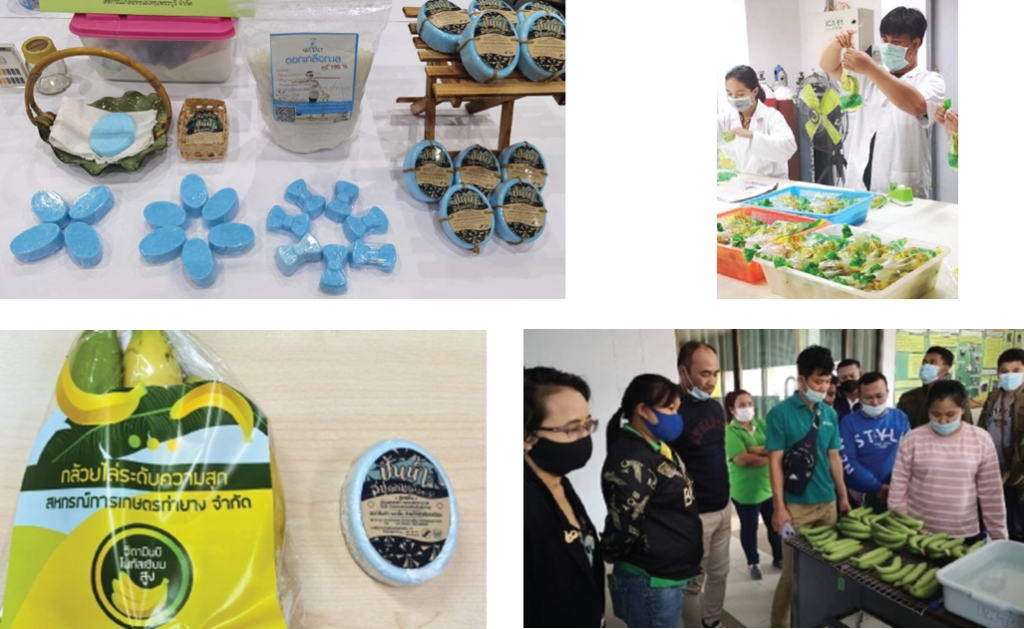
Other areas of university responsibility
Operating Area Non-Din Daeng District Buriram Province
KMUTT, Buriram College of Agriculture and Technology and Biotech NSTDA established “Non-Din Daeng Community Enterprise Incubator Unit” to develop farmers groups to have the ability to process products such as germinated brown rice, concentrated passion fruit juice. and ready to drink frozen passion fruit Roselle juice is concentrated and ready to drink. and tamarind tea Resulting in job creation, occupation, and income for people in the community of 5 villages (30 villagers generate more than 1.6 million baht in income, more than 2.8 hundred thousand baht in profit). Further development of production and other links with surrounding communities such as tourist houses Plant Genetic Cultivation and Conservation Project to make the area a sustainable development area
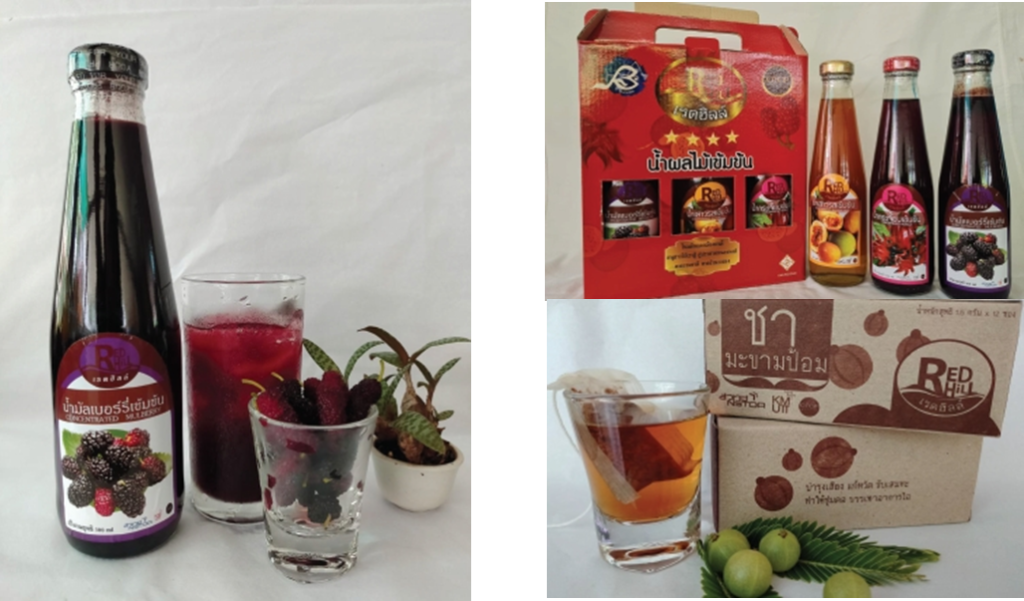
Ban Nang Ngoi Community Operation Area, Tao Ngoi District, Sakon Nakhon Province
Sakon Nakhon is an old community that has been developed and supported by KMUTT and NSTDA to develop into “Tao Ngoi District Community Enterprise Learning Center” is a project owned by the community. From the impact of the COVID-19 crisis on life especially economic problems in the community resulting in decreased consumption Including community development work from various agencies such as Kasetsart University Sakon Nakhon Campus who come to educate and follow up on tilapia farming In the past, the yield was not as good as it should have been. At present, KMUTT, various agencies have started to operate again, such as Siam Kubota Corporation Co., Ltd., providing a tractor with 1 set of equipment to restore the knowledge of indigo dyeing. broom production by dyeing flowers and teaching online marketing
for the development of children and youth Operations are as follows: 1) The project to provide schooling for at-risk children (drugs) to attend regular education with scholarships. Ratchaprajanukhro School 53 2) Experience Enhancement Program for Advanced Vocational Innovation Scholarship Students, Northeastern Area Vocational Program at Northeastern Technological College Udon Thani Province Target group: 108 people (78 Vocational Certificate, 30 Vocational Diploma) Organized a community lifestyle camp at the Community Enterprise Learning Center for 3 days Organized a northeastern heritage camp in Sakon Nakhon and Nakhon Phanom Provinces for 3 days Organized a viewing camp Thai in a foreign country in the area of Chiang Rai 5 days
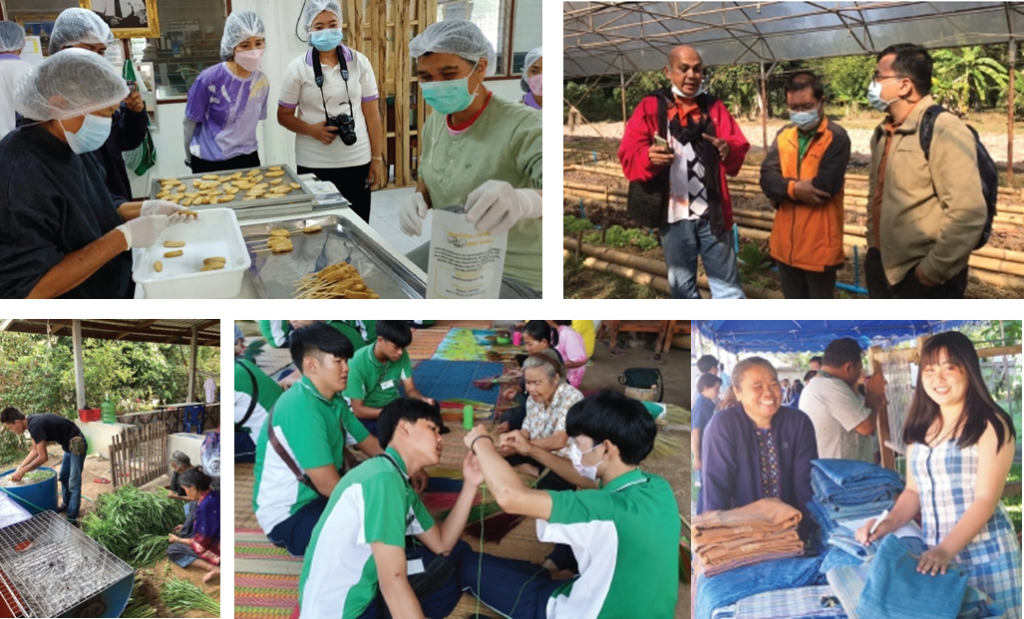
King Mongkut’s University of Technology Thonburi (KMUTT) has developed an innovative radish processing technology that reduces labor, time, and production costs, thereby enhancing income opportunities for the Ban Kha community-based radish enterprise.
Assistant Professor Dr. Mai Noipitak, a researcher at King Mongkut’s University of Technology Thonburi (KMUTT), Ratchaburi Campus, stated that the initiative to develop processing equipment for the Ban Kha community enterprise specializing in radish transformation originated from the group’s inability to meet growing customer demand and their aspiration to enhance production standards. In response, the village headman and the president of the Ban Kha Subdistrict Administrative Organization sought technical consultation and support from KMUTTRatchaburi.Theinitial prototype presented for improvement was a rusted steel radish slicer. After one year of research and development, the KMUTT Ratchaburi research team successfully designed and fabricated a radish processing machine comprising two main components: a slicing unit and a water-extraction unit. The slicing machine integrates an electronic circuit system and is powered by two electric motors connected through a gear reduction mechanism to lower rotational speed. A key feature of the slicer is its array of over 100 stainless-steel blades arranged in parallel, enabling the radish to be cut into uniform strips of desired dimensions.The total investment for the project was approximately 100,000 Thai Baht, supported by funding from the Office of Science and Industrial Park (OSIP), the Division for Promotion and Coordination of Scientific, Research and Innovation Benefits (DPC-SRI), and the Office of the Permanent Secretary, Ministry of Higher Education, Science, Research and Innovation (MHESI). This initiative was part of the Area-Based Innovation for Community program, which aims to promote the application of innovation to enhance local societal and community development.


Upgrading Phulae pineapple to Zero Waste
With a sweet taste The perfect crispness makes “Phulae Pineapple” a GI product of Chiang Rai Province that has orders from China both in the form of fresh fruit. Fruits are peeled or trimmed before being exported every year consecutively. Until now, there is more than 50,000 rai of this type of pineapple planted in Chiang Rai Province, with a production of more than one hundred thousand tons per year. However, the production of Phulae pineapple has a lot of leftover material, which has the potential to be transformed into a high-value product. The process of producing pineapple in various steps Carbon emissions due to foreign import regulations must be taken into account. Including consumers who give importance to Therefore, research is being done to create additional value from the remaining materials in the production process and to obtain figures on the greenhouse gas emissions of Phulae pineapple products by means of collecting data and using photographs. By air It is important to make the Phulae pineapple of Chiang Rai Province Maintain competitiveness in the Chinese market as well as in other countries. Continuously. This is the origin of the project of using innovation to increase the value of waste materials and evaluating the carbon footprint in the production and processing chain of Phulae pineapple in Chiang Rai Province. With the support of the National Research Council of Thailand by Assoc. Prof. Dr. Anak Khanthachawana, Lecturer in the Faculty of Engineering. King Mongkut’s University of Technology Thonburi (KMUTT), as the project leader, said that under this 1-year project (starting operations in April 2023) it consists of 2 sub-research areas: 1.carbon footprint data analysis The process of planting and processing Phulae pineapple throughout the production chain includes designing mathematical processes and algorithms together with using images from unmanned aerial vehicles for analyzing carbon footprint throughout the process of growing Phulae pineapple. and 2.guidelines for adding value and/or creating innovation from the use of leftover materials in the Phulae pineapple processing process according to the Zero waste approach, with the main goal being to raise awareness among farmers or entrepreneurs about the impacts. to the environment that affects the industry as a whole This will lead to a change in the production and management model that is beneficial to both the environment and the Phulae pineapple market both in Thailand and abroad.


2. Related information on our university as a body providing events for local farmers and food producers to connect and transfer knowledge.
KMUTT Center of Excellence in Food Safety
food safety center The Office of Science and Technology Research and Service (KMUTT) has a clear objective and scope of work: to create research work. and development of risk assessment for microbial and chemical hazards in food food safety and risk prevention to support food safety. It is a training, analysis, testing, certification and consulting center for food manufacturers. And food exporters have been certified for production and food safety systems. technology transfer, research findings for widespread dissemination And is used for the benefit in the industrial, private and government sectors involved in the food safety control process. Promote a network of cooperation in research and development. Between government agencies, industry and researchers to establish a Center of Excellence in Food Safety as well as earn money to support research and activities of the center by requesting funding from various agencies. both public and private
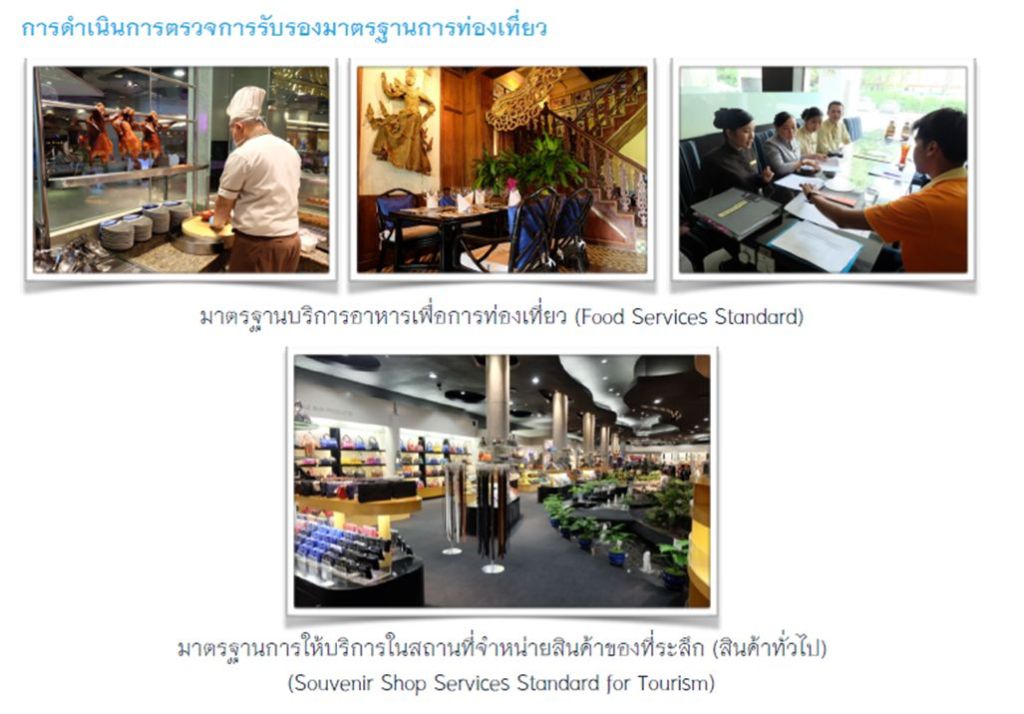
KMUTT promotes SAFETist Farm to create a green economy model from the Bangmod canal farming base
According to information from Bangkok, in the green area of 3,064 rai of Thung Khru district, It is only 400 hectares of “agricultural land”, while more than 60 percent is “vacant land”, which in the past was mostly agricultural land. But it was abandoned after the 2011 Bangkok floods because the soil was so salty that it was unable to plant orchards as before. Therefore, the remaining Thung Khru farmers can earn income from cultivation including income from other activities arising from the capital base of their own sufficient and sufficient resources Therefore, it is an approach that must be taken urgently. To help maintain the green area of Thung Khru to remain. For this reason, Dr. Kanchanee Puttimatee, Lecturer of the Faculty of Architecture and Design King Mongkut’s University of Technology Thonburi (KMUTT) and the research team under the project to develop a prototype community area along the Thonburi side with a network of brains and landscape maps for sustainable green economy development (Green Thonburi Project). with the support of the Research Fund Management and Innovation Management Unit at the local level (TAMC), we would like to create a prototype of the “Green Economy Model” to occur in the Bangmod Canal Community Area. Thung Khru that can build a business from a self-sustaining agricultural capital baseas well as being a manufacturer “Safe food” and “food of the city” for people in the surrounding area at the same time. by Dr. Kanchanee And the research team of KMUTT under the Green Thonburi project has supported “SAFETist Farm” which was born from the dream and determination of the new generation who came to change the area of over 2 rai. Along the Bang Mot Canal from where oranges were once planted and abandoned To become a safe food production source for people in the group two years ago. in the form of activities “Vegetable basket family” “We want to bring the green economy back to the Thung Khru agricultural community and the Bangmod canal community again. It may not be in the original form of an orange orchard. but is a combination of many styles both the subject of agriculture tourism, etc. to create a new economic model that will benefit both with the community and the environment at the same time.”ทีมงาน SAFETist Farm Want to bring agricultural knowledge from the farm to pass on to people in the community and real practice as an additional income for each family Through training activities that are available in 3 careers, namely, “Earthworms Care”, “Sapling Care” and “Pot Vegetable Planting Profession”, more than 50 people have been trained.

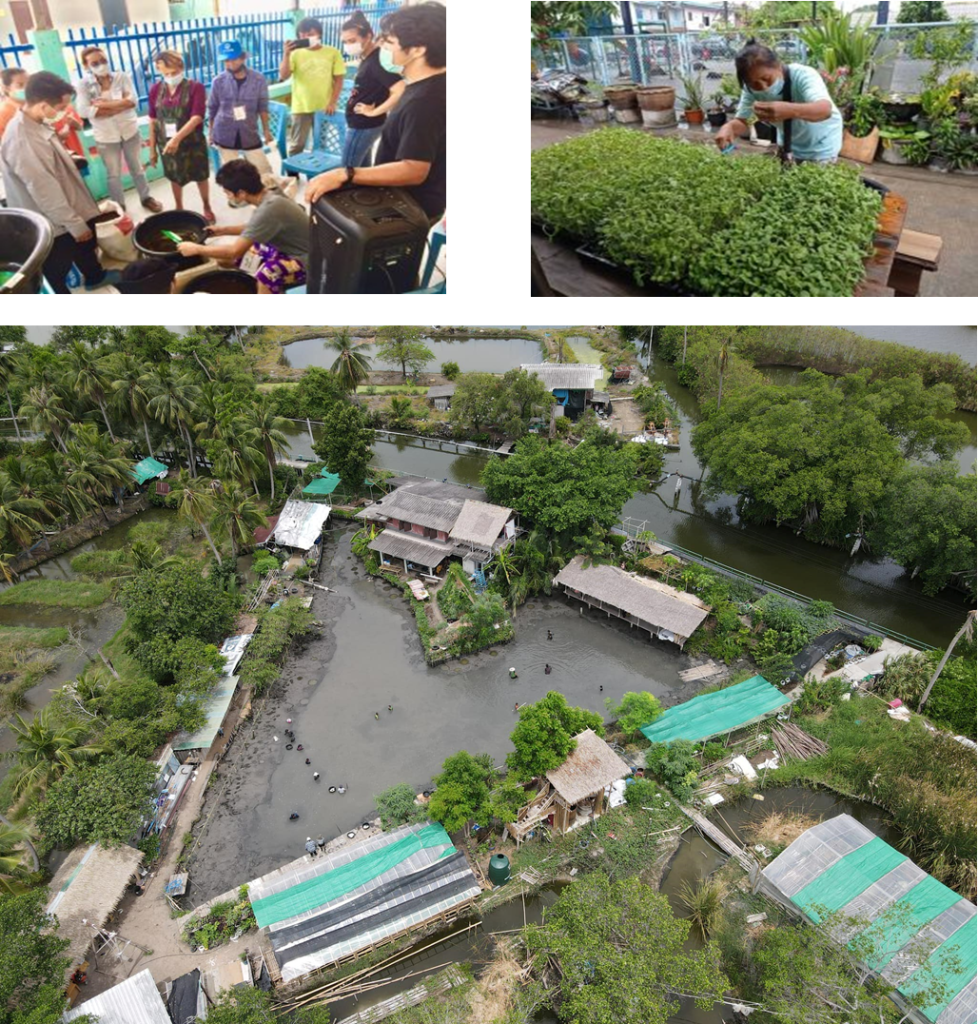
“The application of solar electric fence technology for raising animals”
With farmers in Rang Bua Sub-district, Chom Bueng District, Ratchaburi Province, using wire as an electric fence to be attached to a car battery to keep pets in the grazing area which is far from the community and the power transmission line cannot reach Therefore, the battery must be brought back to charge the electricity at the house on average 2-3 days / time. The joint working group of RSC / SorPor. in battery Applies to “electric fences” and other electric devices. Facilitates farmers Help reduce the average energy cost per year 2,500 baht/household and promote the use of clean energy that is environmentally friendly Performance consists of 1) 119 farmers passed the training 2) Collaboration network from 7 professors/personnel of KMUTT and 3) Learning center for solar power generation systems for agriculture to be a place for study visits/expansion of technology on clean energy application according to the new agricultural theory
“Application of drip irrigation technology project for vegetable gardening with solar energy”
Most areas in Rang Bua Subdistrict are sandy loam soils that do not absorb water. Outside in the irrigated area, the agricultural way of life relies mainly on rainwater. And the problem of water shortage every year, the joint working group RSC/SorPor Along with installing an automatic plant watering control system via smartphone as a result, it can save water and use water more efficiently for plants. Reduce the cost of fuel pumping (12,000 baht/household) reducing the impact on the environment. Reduce working time and agricultural labor The important thing is that farmers can cultivate and generate income all year round. (After paddy fields during the dry season, the average annual income increased by 5,000 baht/household). 1) 27 farmers passed the training, 2) a network of cooperation from 7 KMUTT teachers/personnel and 3 KMUTT students, and 3) a learning center for solar power generation systems for agriculture. for study visits/expansion of technology at 3 places
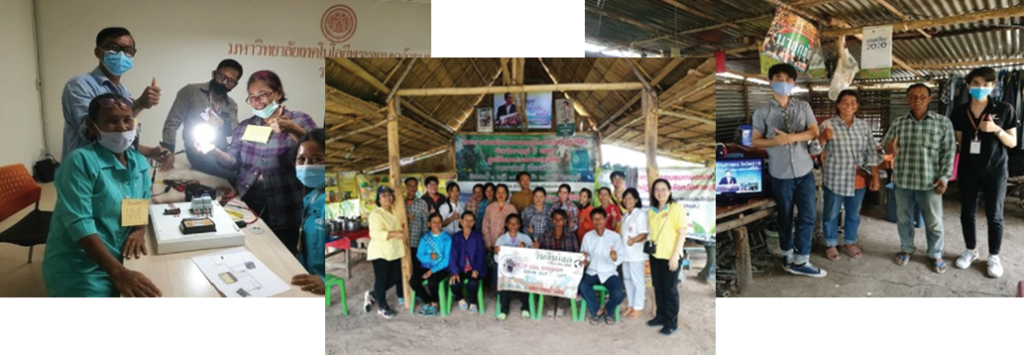
“Technology transfer project for the processing of agricultural products”
Radish products According to food safety standards and increasing production efficiency with turnip thresher: Community Enterprise Group Ratchaburi Province, lettuce or radish is grown the most in the western region (Ratchaburi, Phetchaburi, Ban Kha Lettuce Producer Community Enterprise was established in Ban Kha District, Ratchaburi Province. (30 members, planting area 66.4% of the total planting area in Ban Kha Produce pickled radish roots in the traditional way By kneading turnips with salt and preservatives, drying for 3 days, then flavoring. The results of random measurements of preservatives found that they exceeded the food standards. The research team has promoted various knowledge such as testing for microorganisms Preservative and Bleach Tests and hygienic processing as a result, operators use measuring scales to measure more accurately. Reduce the amount of preservatives (safe) and improve the packaging to be suitable for storage. In this regard, the innovation of turnip threshing machine was transmitted. Reduce workload and labor shortage problem Bacterial spoilage Helps to increase profits by 25 percent and increase daily production by 2 times, while still maintaining the original taste identity.
Technology and innovation transfer activities for radish processing

“Knowledge transfer activity project production technology Processing of agricultural products
under product and product development projects Department of Cooperative Promotion by Food Safety Research Center, NSTDA (5 people, 2 outside) and postharvest management students (2 people) operating the project in Phetchaburi Province. namely 1) product development “Graded Banana” Tha Yang Agricultural Cooperative, and 2) packaging development and acceptance testing. “Sea Salt Flower Soap” Thai Sea Salt Cooperative Through the process of consulting and transferring technology 50 people (2 co-operatives) The expected economic impact is to increase income for farmers and increase the value of raw materials. Social impact is to support lifelong education for people. In 2022-2023, Sea Salt Flower Soap Group received Area-based Innovation. for Community, PDR, Ministry of Education, to increase the potential of product development processes, brand building, and connecting product markets.that is a community identity.
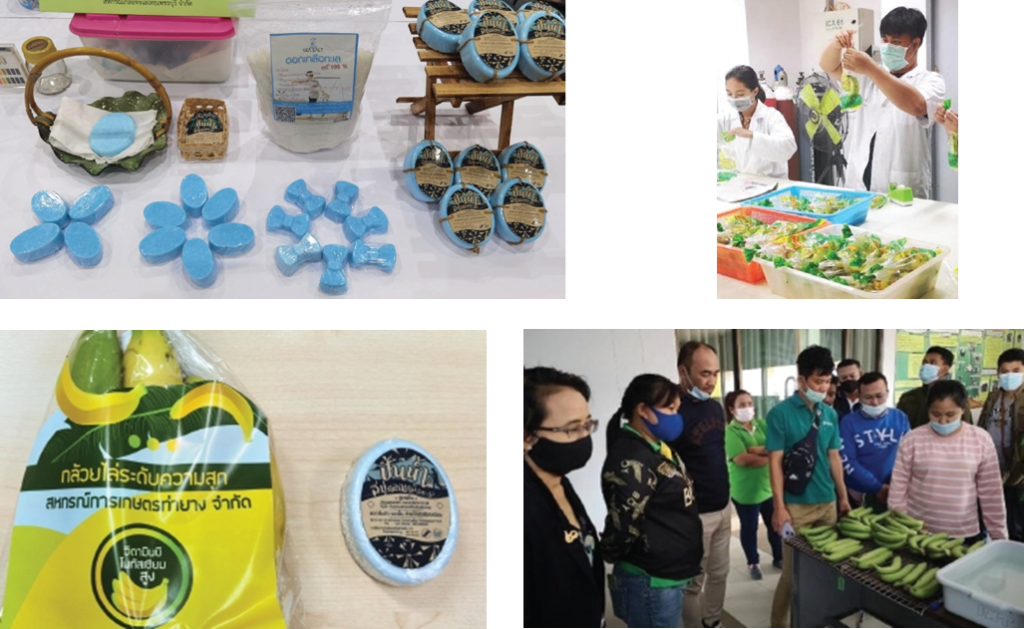
Operating Area Non-Din Daeng District Buriram Province KMUTT, Buriram College of Agriculture and Technology and Biotech NSTDA established “Non-Din Daeng Community Enterprise Incubator Unit” to develop farmers groups to have the ability to process products such as germinated brown rice, concentrated passion fruit juice. and ready to drink frozen passion fruit Roselle juice is concentrated and ready to drink. and tamarind tea Resulting in job creation, occupation, and income for people in the community of 5 villages (30 villagers generate more than 1.6 million baht in income, more than 2.8 hundred thousand baht in profit). Further development of production and other links with surrounding communities such as tourist houses Plant Genetic Cultivation and Conservation Project to make the area a sustainable development area
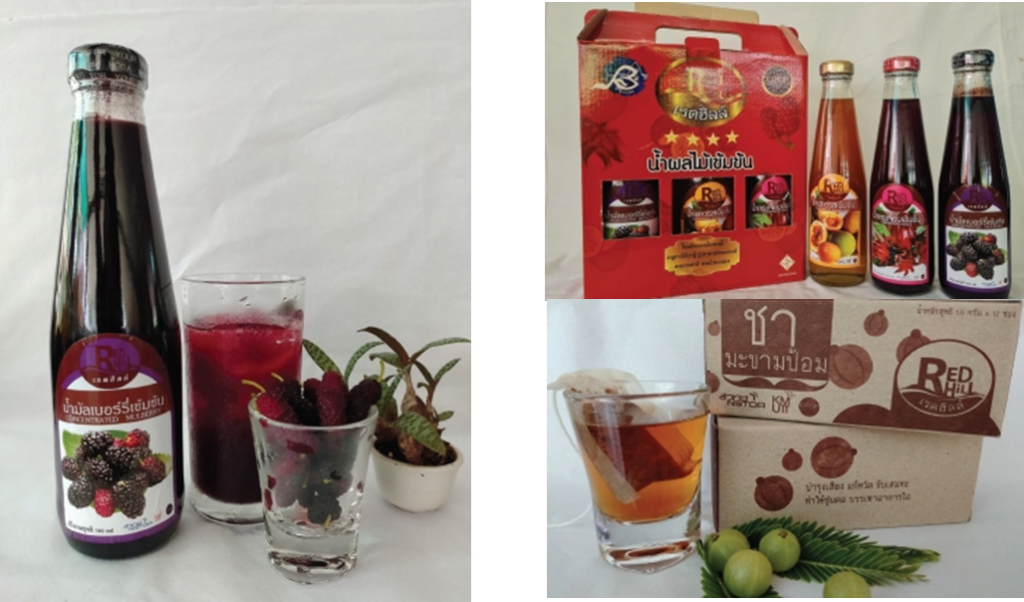
Ban Nang Ngoi Community Operation Area, Tao Ngoi District, Sakon Nakhon Province
Sakon Nakhon is an old community that has been developed and supported by KMUTT and NSTDA to develop into “Tao Ngoi District Community Enterprise Learning Center” is a project owned by the community. From the impact of the COVID-19 crisis on life especially economic problems in the community resulting in decreased consumption Including community development work from various agencies such as Kasetsart University Sakon Nakhon Campus who come to educate and follow up on tilapia farming In the past, the yield was not as good as it should have been. At present, KMUTT, various agencies have started to operate again, such as Siam Kubota Corporation Co., Ltd., providing a tractor with 1 set of equipment to restore the knowledge of indigo dyeing. broom production by dyeing flowers and teaching online marketing
for the development of children and youth Operations are as follows: 1) The project to provide schooling for at-risk children (drugs) to attend regular education with scholarships. Ratchaprajanukhro School 53 2) Experience Enhancement Program for Advanced Vocational Innovation Scholarship Students, Northeastern Area Vocational Program at Northeastern Technological College Udon Thani Province Target group: 108 people (78 Vocational Certificate, 30 Vocational Diploma) Organized a community lifestyle camp at the Community Enterprise Learning Center for 3 days Organized a northeastern heritage camp in Sakon Nakhon and Nakhon Phanom Provinces for 3 days Organized a viewing camp Thai in a foreign country in the area of Chiang Rai 5 days
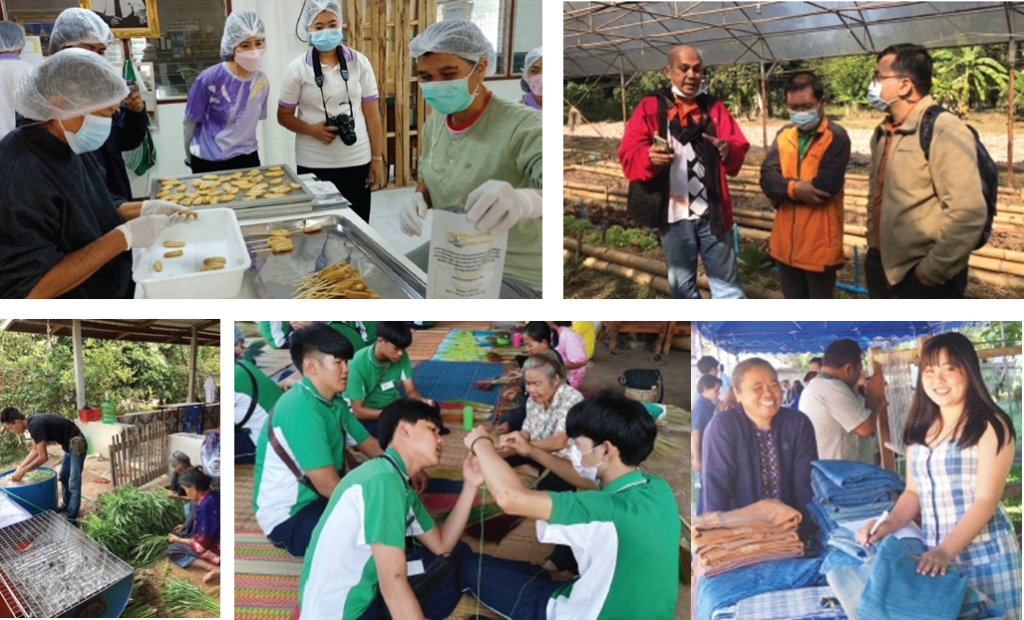
Zero Waste Agriculture Goat Farm Management in Thung Khru Area
In addition to the agricultural method of plant cultivation Some communities have a career in raising goats. Especially Muslim farmers in Thung Khru area. and received environmental complaints Including problems in waste management within the farm. Researcher at Research Center and Service for Community and Society Together with the network has implemented the project. “Zero Waste Agriculture Goat Farm Management in Thung Khru Area”Organize technology development activities as participatory farmers in 2 issues: 1) waste management from goat farms (production of goat manure fermented fluff 2) household fresh waste management 2 (using a simple fermentation box) Key Hole Vegetable Plot biochar production and planting materials) to gain knowledge from local speakers and networks There are the main farmers of Thung Khru Farmers Group. Chundarul Ibadah Enterprise Group and more than 50 interested people participatedAiming to create “core agriculture” and waste management in the farm and in the household. Through the process of learning and doing it at the same time, to be a model for expanding the results to farmers. and people in the community

Community product development and upgrading project “Caramia Goat Milk Soap” of Darul Ibakah Community Enterprise, Thung Khru District
Center for Research and Service for Community and Society Visit and select community products of Darul Ibadah Community Enterprise, namely “Goat Milk Soap” in the name of CARAMIA or Karamia to participate in the development and upgrading of community products.

Bang Ka Chao Subdistrict Development Project (U2T) by Asst. Prof. Dr. Penchan Mekwijitsaeng
Bang Kachao Subdistrict consists of 9 villages with a population of 1,869 households and 5,104 people. Based on the 5 dimensions of basic needs (health, well-being, education, income, access to government services), it was found that sub-districts had the greatest need for health improvement. This may be due to the survey being in the state of the COVID-19 epidemic causing the public toin need of health services
KMUTT’s knowledge used in the project is the application of spirulina in raising lobster fry and raising chickens to produce omega-fat. and the use of DHA-producing microorganisms for omega-fat production in chicken farming Performance is as follows.
– Shrimp nursery in cages Spirulina powder is used to mix food. Contributes to helping shrimp fry and stay healthy. when released into the garden (1 project participant’s garden in the area, which is a garden that does not use pesticides. resulting in a good weight of shrimp production However, monitoring of shrimp growth has not yet been carried out due to the open conditions of the area. Effect damage chance (so shrimp is high from natural enemies)
– Chicken farming (at Bang Kachao Farm) has mixed algae 10 in the feed. Test results. Nutrients in eggs from hens aged 33 days found that omega 3-6 fats increased by 10.48%. While normal eggs provide only 8.48 percent of fat and the amount of DHA is not different.
– Chicken raising (at Wat Rat Rangsan School) mixed with microorganisms Aurantiochytium sp. in feed (produced from Sor Bor. Laboratory) for raising chickens in 2 age groups: 1) old hens (3 years old) and 2) normal hens aged 1-1.5 years. received 0.03 and 0.06 g/body/day of microorganisms The number of laying hens increased from 50% to 80% and 90%, respectively, and the egg weight increased from 47.6 g to 56.04 and 59.7 g, respectively for old hens fed 0.2 g/bird. /day for 20 days, eggs were given omega 3-6 fat at 9.29%, which was higher than the hens that did not get it (8.09%).
For the second phase, the production of omega eggs will be expanded into egg powder or rice powder. (may be mixed with local vegetables, spinach) In addition, the community is interested in making liver from (because the area does not have Must buy from Phra Samut Chedi side) Processing into sugar (Prototype of sugar production from Nakhon Si Thammarat Province, G value of sugar from < 30 is a health food group) and water tourism to watch fireflies.
Native Honeybees and Pollinator Research Center
On November 1, 2021, it was a product development training for Wat Kaew Subdistrict. in order to make the product more reliable Help build brand identity to be in the form of a community enterprise analyze customer groups and develop further to be more efficient

Between December 21-23, 2021, the Native Bee Research Center and Bring Eleplant Home, World Wildlife Fund (WWF) organized a training to transfer Thailand’s native beekeeping technology in an integrated agricultural garden at the Forest Conservation and Restoration Project. Kui Buri Forest National Reserve arising from royal initiatives Kui Buri District, Prachuap Khiri Khan Province The goal is to generate income and to be a buffer line to prevent “elephant” from destroying the villagers’ agricultural crops. in order to be able to live together sustainably
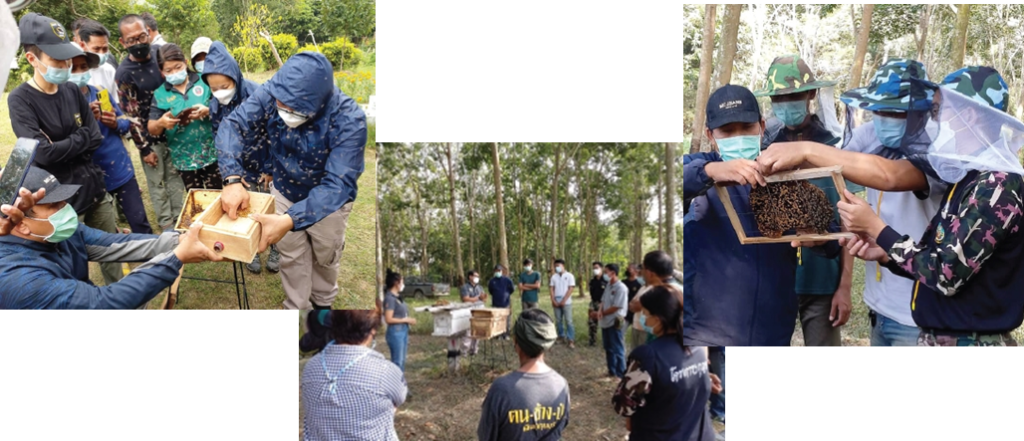
Income-elevating project Integrated sub-district (1 sub-district 1 university project)
Training on technology transfer on the cultivation of native bees of Thailand, hollow bees and stingless bees with different characteristics in each aspect. How to move each honeycomb species in natural areas and integrated agricultural gardens for farmers from various sub-districts such as Wat Kaew Subdistrict, Bang Phae District, Pak Tho Subdistrict, Pak Tho District, Berk Phrai Subdistrict, as well as Subdistrict Administrative Organization officials. Integrated Agricultural Demonstration Plot Project under the Royal Initiative “New Theory” Participants were interested and gained ideas for applying it in the crop cultivation cycle in the future.
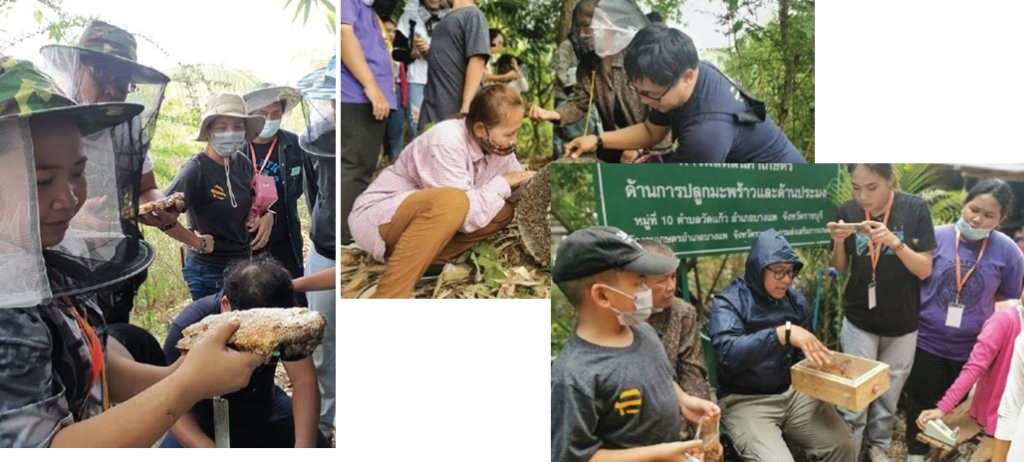
In addition, on October 27, 2021, the U2T group in Bua Ngam Subdistrict organized a training event to transfer stingless farming technology. To those who are interested in the area to apply in their own garden. received good attention Then on November 30, 2021 Received a workshop on farm management and harvesting of Thai native bees and stingless bees. Under the U2T project, Wat Kaeo Subdistrict, Bang Phae District and U2T Bua Ngam Subdistrict, Damnoen Saduak District and went on a study tour Beekeeping and stingless beekeeping at Thai Native Beekeeping and Sun Rong Enterprise Group, Ban Kha District (Rai Thiti Tha Arun), Ban Kha District, Ratchaburi Province

King Mongkut’s University of Technology Thonburi (KMUTT) has developed an innovative radish processing technology that reduces labor, time, and production costs, thereby enhancing income opportunities for the Ban Kha community-based radish enterprise. Assistant Professor Dr. Mai Noipitak, a researcher at King Mongkut’s University of Technology Thonburi (KMUTT), Ratchaburi Campus, stated that the initiative to develop processing equipment for the Ban Kha community enterprise specializing in radish transformation originated from the group’s inability to meet growing customer demand and their aspiration to enhance production standards. In response, the village headman and the president of the Ban Kha Subdistrict Administrative Organization sought technical consultation and support from KMUTTRatchaburi.Theinitial prototype presented for improvement was a rusted steel radish slicer. After one year of research and development, the KMUTT Ratchaburi research team successfully designed and fabricated a radish processing machine comprising two main components: a slicing unit and a water-extraction unit. The slicing machine integrates an electronic circuit system and is powered by two electric motors connected through a gear reduction mechanism to lower rotational speed. A key feature of the slicer is its array of over 100 stainless-steel blades arranged in parallel, enabling the radish to be cut into uniform strips of desired dimensions.The total investment for the project was approximately 100,000 Thai Baht, supported by funding from the Office of Science and Industrial Park (OSIP), the Division for Promotion and Coordination of Scientific, Research and Innovation Benefits (DPC-SRI), and the Office of the Permanent Secretary, Ministry of Higher Education, Science, Research and Innovation (MHESI). This initiative was part of the Area-Based Innovation for Community program, which aims to promote the application of innovation to enhance local societal and community development.
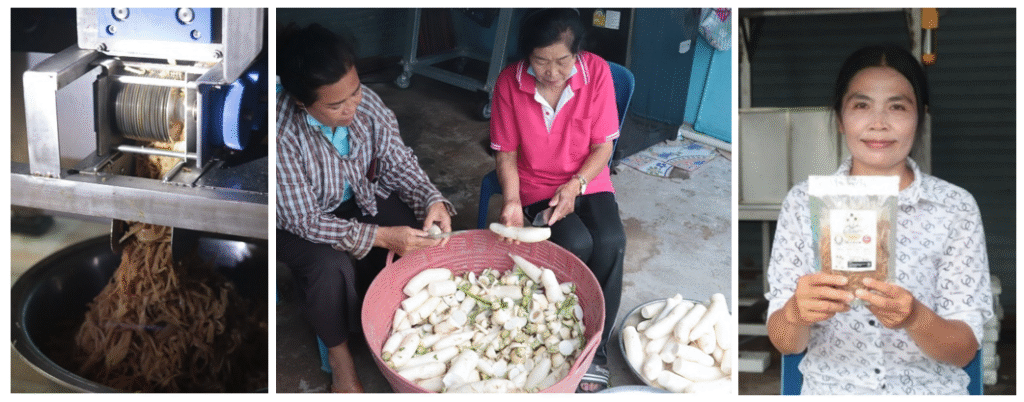
3. Related information on our university as a body providing access to university facilities (e.g. labs, technology, plant stocks) to local farmers and food producers to improve sustainable farming practices.
KMUTT Food Safety Center conducted the development research and transfer of food safety technology, assessment of food safety risks including interventions to reduce the risks. Therefore, food was safe, good for the health, with the following main policies:
- To create researches and knowledge about food safety from the production process, processing process, safety management system, risk of food, and appropriate interventions.
- To develop a rapid test kit that can quickly identify problems and solutions for safety and quality problems of the food and related industries.
- To be the Training Center for Technology Transfer and Food Safety Management System( Sanitation Standard Operating Procedures (SSOP), Good Manufacturing Practices (GMP), Hazard Analysis and Critical Control Point (HACCP), and ISO standards related to food production), such as ISO 22000 (Food Safety Management Systems, FSMS) and food risk as well as having a research laboratory within the organization related to safety and risk.
- To promote cooperation coordinates between universities, the private, and the government sector to create cooperation, research, and development including the transfer of knowledge and appropriate implementation.
- To promote the development of personnel in private and government sector by cooperative research and development together with relevant networks. There were also exchanging students or researchers with agencies in the network of cooperation both domestically and overseas.
Food Safety Center at KMUTT

Development and application of advanced technology for food production of the future It is a project that receives research funding from the National Science and Technology Development Agency (NSTDA).
Prof. Dr. Sakkamon Thephasadin Na Ayudhya, King Mongkut’s University of Technology Thonburi (KMUTT), as the lead researcher and project leader Has given the meaning of the food of the future that The food of the future is food developed by applying advanced technology to meet the needs of consumers in the future. However, the technology used is both newly invented. and developed from the existing technology to make it even better Can be applied to the food industry or suitable for interested products. The results of the research will be useful in the future for both household and industrial applications.
Prof. Dr. Sakkamon said that as a researcher Trying to look forward to what the future food trends will be. From the study of information in many sectors The research team therefore proposed a research topic under “Development and application of advanced technology for food production of the future” Total of 6 groups, namely “Natural food coloring” “Nano-cellulose fibers from vegetable and fruit scraps to be used as food additives. thickener and stabilizer” “konjac konjac coating to protect nutrients or microorganisms that are beneficial to the body from being destroyed” “Production of high-quality, caffeine-free roasted coffee beans using superheated steam,” “functional biogels from agricultural waste,” and “portable food residue detection devices,” which are mainly Projects that have been continuously researched and developed

Pilot Plant Development and Training Institute (SorPor.) has one goal. Focus on supporting small and medium enterprises (SMEs) in terms of technology transfer and incubation, helping to reduce gaps and technology transfer bottlenecks. To SMEs entrepreneurs to develop the capabilities of existing SMEs to be able to compete in the global market. By providing services in joint research and development and training on specific technology transfer. Including analytical and testing services and give advice as well as prototype factory services to test production and study the technical feasibility and economics, focusing on research, development, and innovation in 4 main areas (3F 1P)

freeze dryer service
Food preservation service freeze drying machine Open for service at the Bioprocess Research and Innovation Building (BRI), KMUTT, Bang Khun Thian. operate with Engineering and Systems Unit Pilot Plant Development and Training Institute King Mongkut’s University of Technology Thonburi freeze drying process It is a freeze drying technology. The temperature must be negative. The water contained in the product to be dried will be an ice grid. Therefore, it heats the ice and sublimates it into steam. in each process Operated by researchers and engineers of the pilot plant development and training institute under modern equipment Ready to provide services to the government sector, private sector, farmers communities and community enterprises.
“Technology transfer project for the processing of agricultural products”
Radish products According to food safety standards and increasing production efficiency with turnip thresher: Community Enterprise Group Ratchaburi Province, lettuce or radish is grown the most in the western region (Ratchaburi, Phetchaburi, Ban Kha Lettuce Producer Community Enterprise was established in Ban Kha District, Ratchaburi Province. (30 members, planting area 66.4% of the total planting area in Ban Kha Produce pickled radish roots in the traditional way By kneading turnips with salt and preservatives, drying for 3 days, then flavoring. The results of random measurements of preservatives found that they exceeded the food standards. The research team has promoted various knowledge such as testing for microorganisms Preservative and Bleach Tests and hygienic processing as a result, operators use measuring scales to measure more accurately. Reduce the amount of preservatives (safe) and improve the packaging to be suitable for storage. In this regard, the innovation of turnip threshing machine was transmitted. Reduce workload and labor shortage problem Bacterial spoilage Helps to increase profits by 25 percent and increase daily production by 2 times, while still maintaining the original taste identity.
Technology and innovation transfer activities for radish processing

“Connecting the Cultural Landscape of the Karen Pwo in the Tenasserim Mountain Range to Promote Local Consciousness, Inspire Creativity, and Generate Appropriate Economic Benefits”
This project is led by Associate Professor Nantana Boonlor, principal investigator in the field of cultural capital research and faculty member at the School of Architecture and Design, King Mongkut’s University of Technology Thonburi (KMUTT). The initiative is carried out in collaboration with the Highland People Development Center in Ratchaburi Province, under the research funding provided by the Program Management Unit for Area-Based Development (PMU-A) for the fiscal year 2024. The project is conducted within the research framework titled “Cultural Capital Management for Enhancing Community Economy and Local Consciousness.”
Technology Transfer
The mission of Technology Transfer Office or TTO is to promote dissemination and the transference of the technology born out of the university’s research and intellectual property (IP) for commercialization. With an aim to transfer valuable technology to involve all partners, including the manufacturing and hospitality sectors as well as the community, TTO provides both IP management and technology licensing services.

The KMUTT Industrial Park is a prime example for the effective management of research and development. The Park will provide the appropriate mechanisms and suitable environment to bring together researchers, industrialists and entrepreneur from both out of the laboratories and directly into the production process. The Park also helps to promote and develop science and technology throughout Thailand and assist industry in making the correct investment and technology decisions.
Industrial Park Center offers the community specialist services which build up cooperation with the private sector by providing opportunities for technological manufacturers having limited funds. They will be able to rent the center’s Incubator Unit for setting up their own research units and pilot products. It also gives assistance and advice on academics, equipment and doubtful points, including training services to people in general and to the personnel of the industries in order to serve high technology.

KMUTT Visits Dairy Farms in Ratchaburi Province
On July 24, 2025, Associate Professor Dr. Sakarindr Bhumiratana, advisor to King Mongkut’s University of Technology Thonburi (KMUTT), along with a team of professors and researchers, in collaboration with FrieslandCampina (Thailand) Public Company Limited, visited the Dam Noen Saduak Dairy Farmers Group and local dairy farms at the Raw Milk Collection Center of the Chom Bueng Dairy Farmers Group in Ratchaburi Province.They were welcomed by Mr. Boonrit Josannuson, manager of the milk center, who shared the challenges faced by small-scale dairy farmers. These included rising feed costs, resource shortages, and limited access to technology, which have led many farmers to gradually abandon dairy farming.In the afternoon, the working group held a meeting to discuss the development of the Vocational Education for Rural Development Project and a professional dairy farming curriculum in collaboration with Ratchaburi University of Agriculture and Technology. The joint initiative aims to offer short-term training courses for farmers to promote the sustainability of dairy farming as a profession and strengthen the country’s food security.

KMUTT Ratchaburi Visits Civic Agrotech Co., Ltd. to Explore Agricultural Innovation Collaboration
On March 31, 2025, Assistant Professor Dr. Rungroj Piyapanuwat, Assistant to the President for Research and Industry at KMUTT Ratchaburi, along with Mr. Jirapan Nueangjaknil, Head of the Center for Research and Community Services, Dr. Warakorn Rattanaareekul, Head of the Agricultural Technology Transfer Center, and Dr. Thanyarat Khongkhuntien, visited Civic Agrotech Co., Ltd. and met with Mr. Chingchai Khonthansakul, Chairman of the Executive Board. The meeting focused on potential collaboration in joint research to enhance the value of high-value agricultural products through the application of lighting design knowledge across different light spectrums and IoT technology for environmental control in greenhouses. Discussions also included internship opportunities for students in the Intelligent Systems Engineering program, aiming to develop their skills and apply them to agricultural industries—ultimately contributing to the advancement of Thai farmers in the future.

This poster presents the “Na Ae Market” project, a community-based economic and cultural model in Ban Na Ae, Ratchaburi Province. The project serves as a platform for collaboration between researchers, students, and community members, reviving and building upon local wisdom and culture to create economic and social value.
Research Steps for Community Development
- The first step involved field surveys and collecting local knowledge from Ban Na Ae and the surrounding subdistricts, focusing on their unique cultural heritage and economic potential.
- The next phase emphasized participatory research, selecting 20 villagers from four villages to co-create a ‘community mapping activity,’ gathering spatial, resource, and traditional knowledge.
- This process resulted in tangible outcomes such as the creation of Na Ae market spaces, educational materials, and activities that shared community identity and wisdom.
Community Impact and Reflections
- Project participants expressed that working together increased pride in their heritage, helped them understand community challenges, and provided opportunities to adapt traditions for modern use.
- Local leaders and researchers emphasized the importance of collaboration, mutual learning, and preserving traditions as key to sustainable community development.
Project Background
This work is part of the project “Participatory action research and community-based economic and cultural model development: Na Ae Market,” led by King Mongkut’s University of Technology Thonburi (KMUTT) in partnership with local agencies and community members in Ratchaburi.


4. Related information on our university as a body on prioritizing purchase of products from local, sustainable sources.
KMUTT brought products around the university and from various areas, which had been helped by KMUTT technology in production development, in order to sell on the campus and to craft as a gift basket as a souvenir for special occasions.

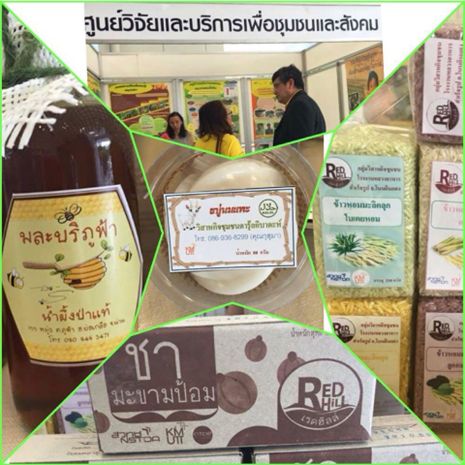
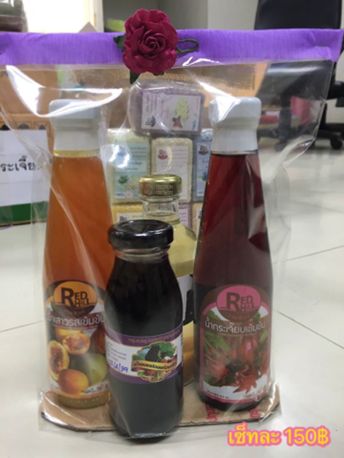
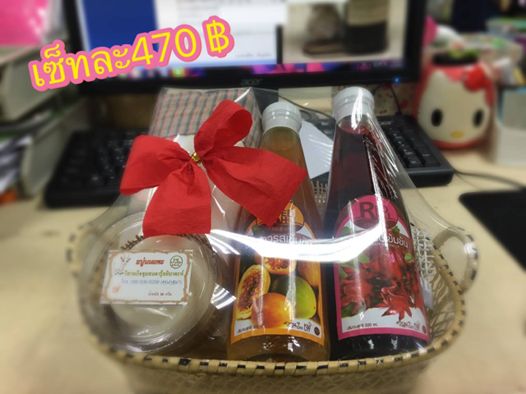
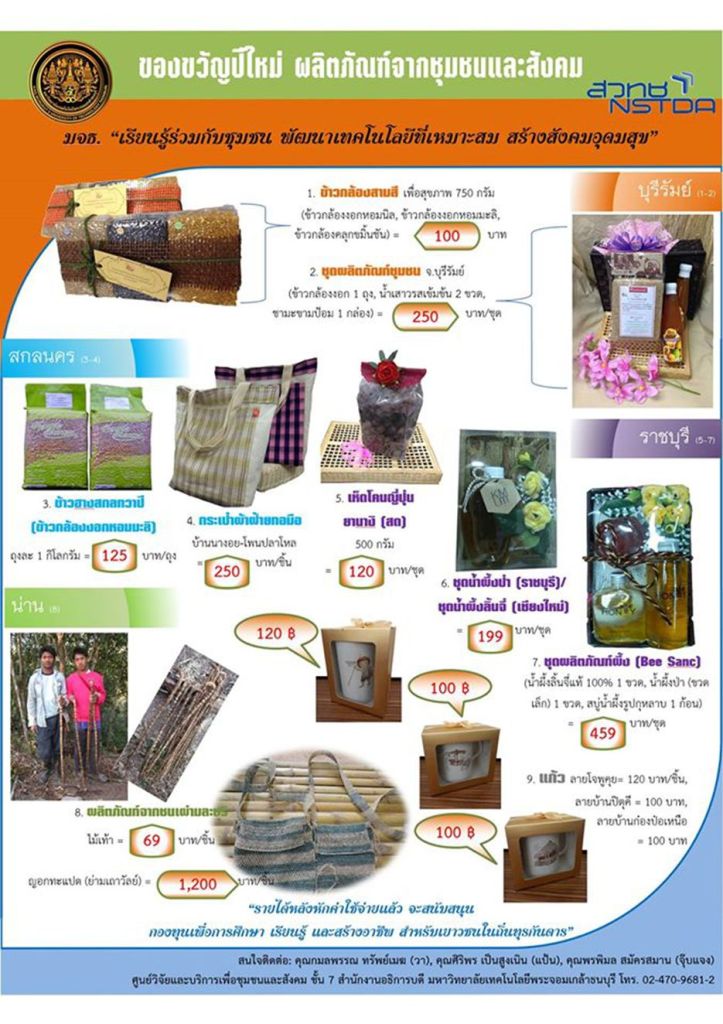
Community Market @KMUTT
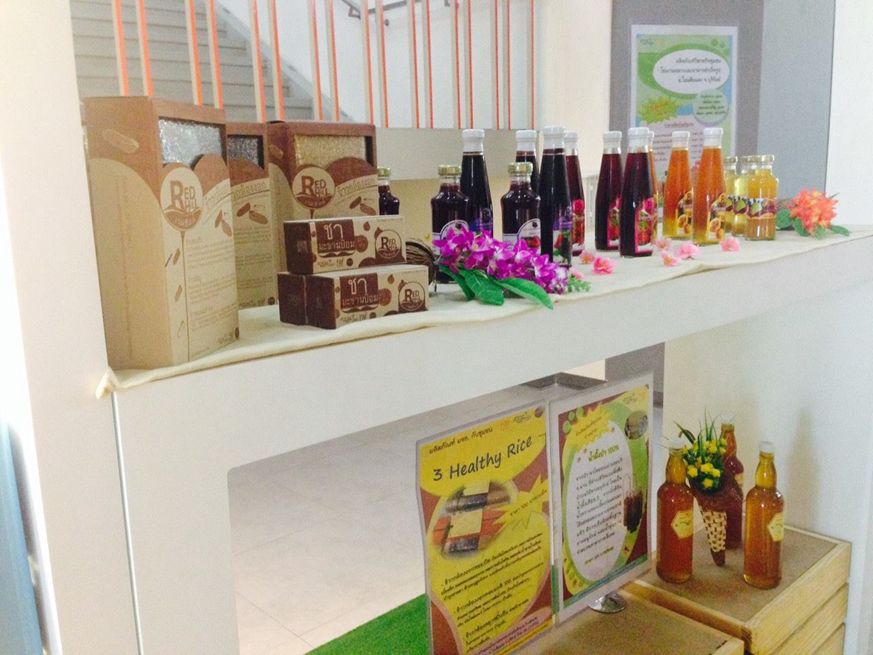
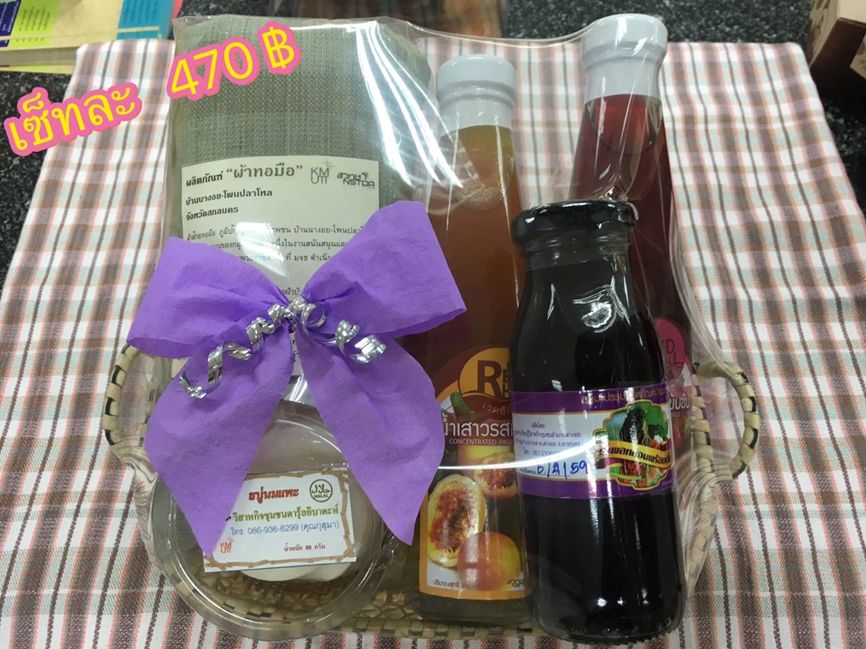
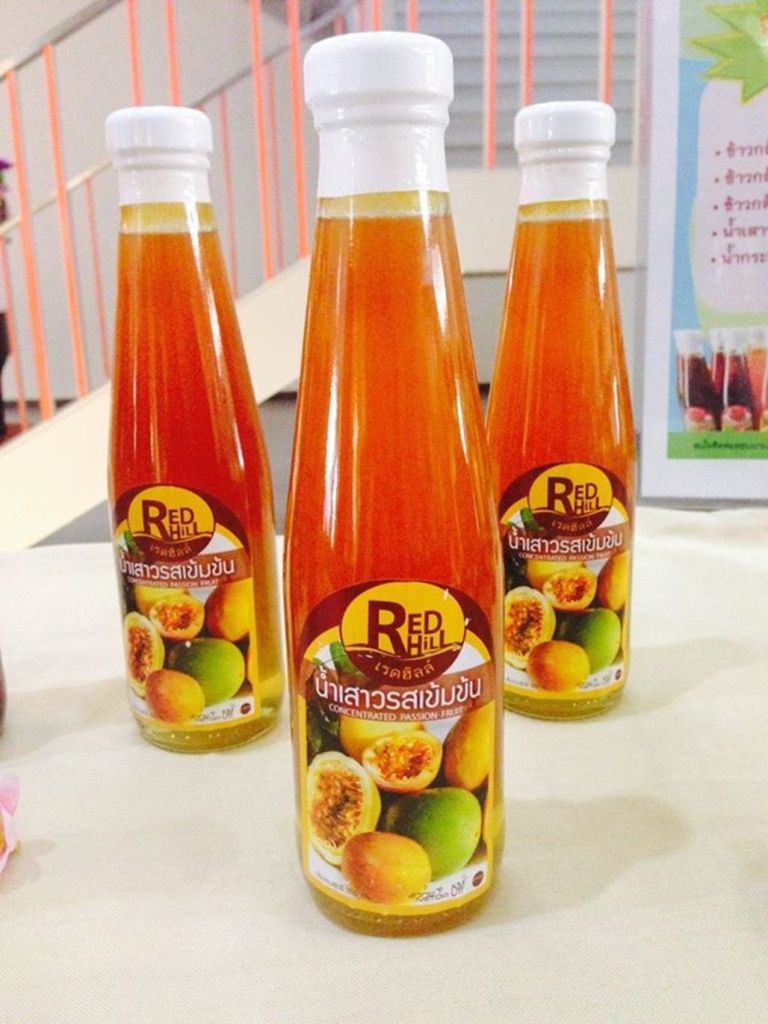
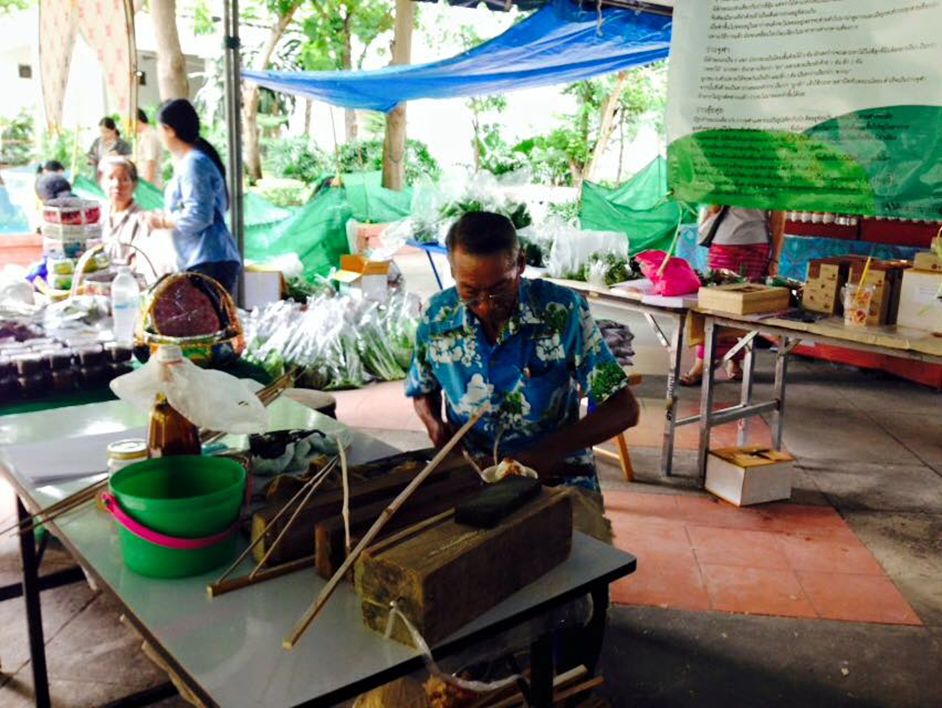
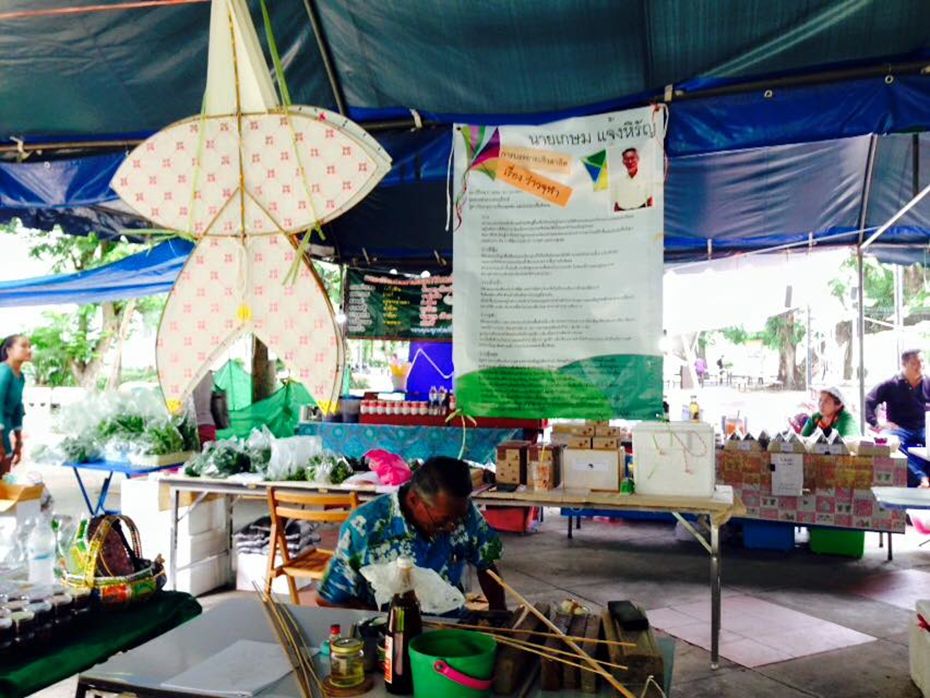
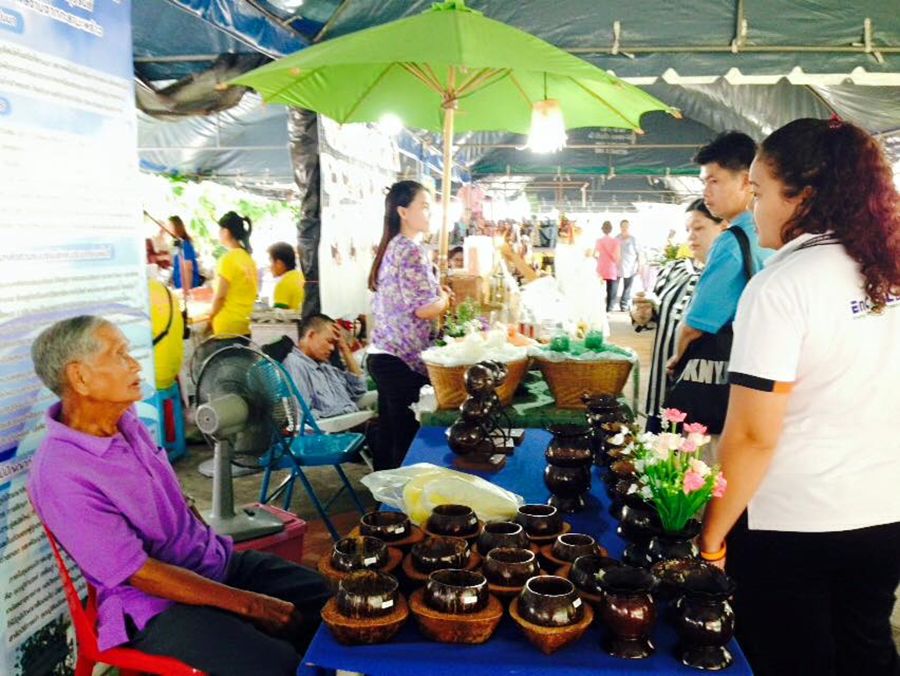
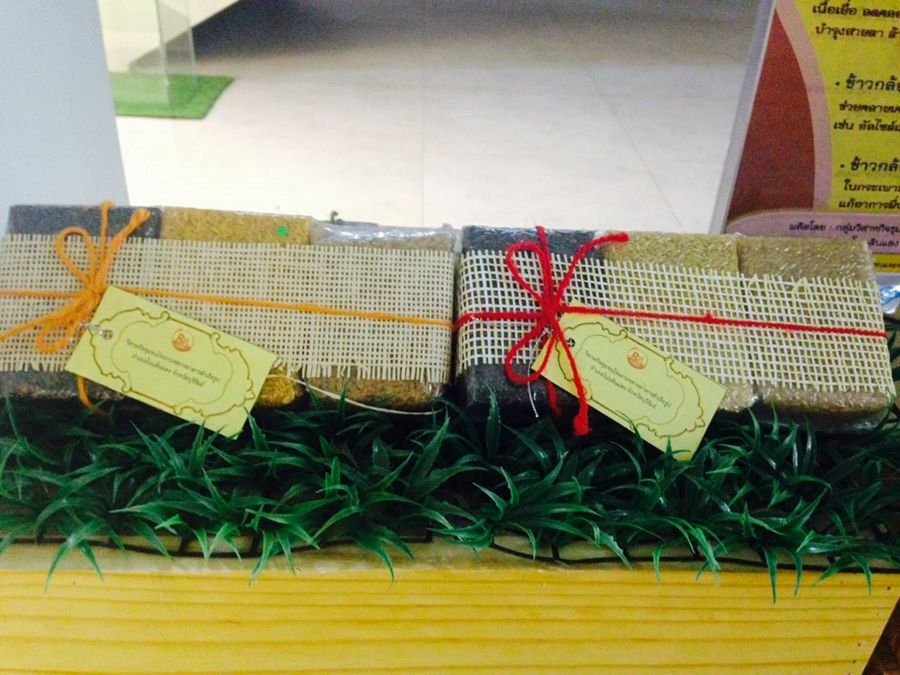
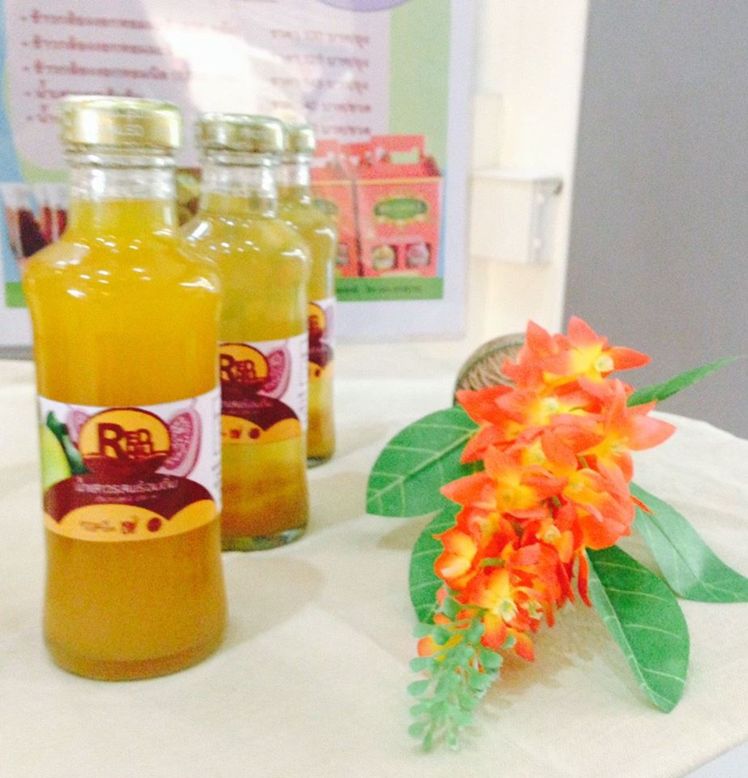
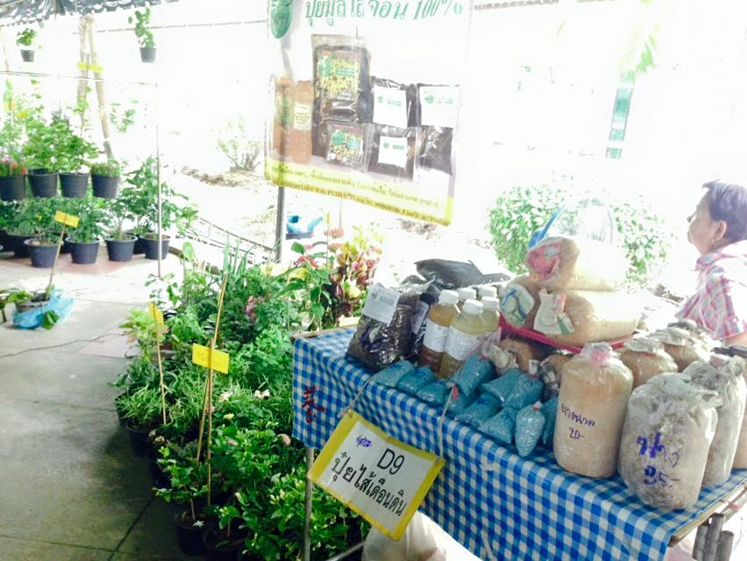
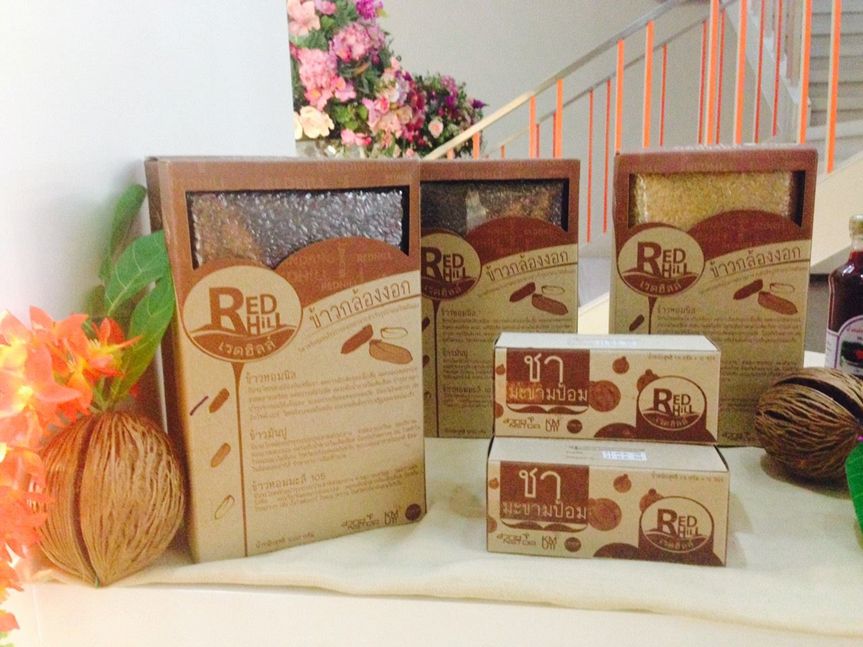
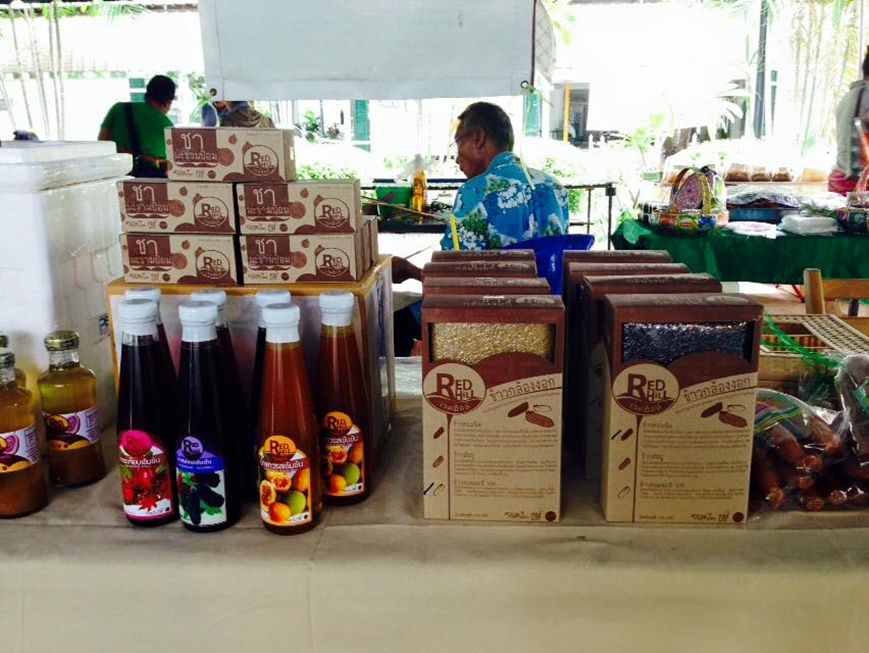
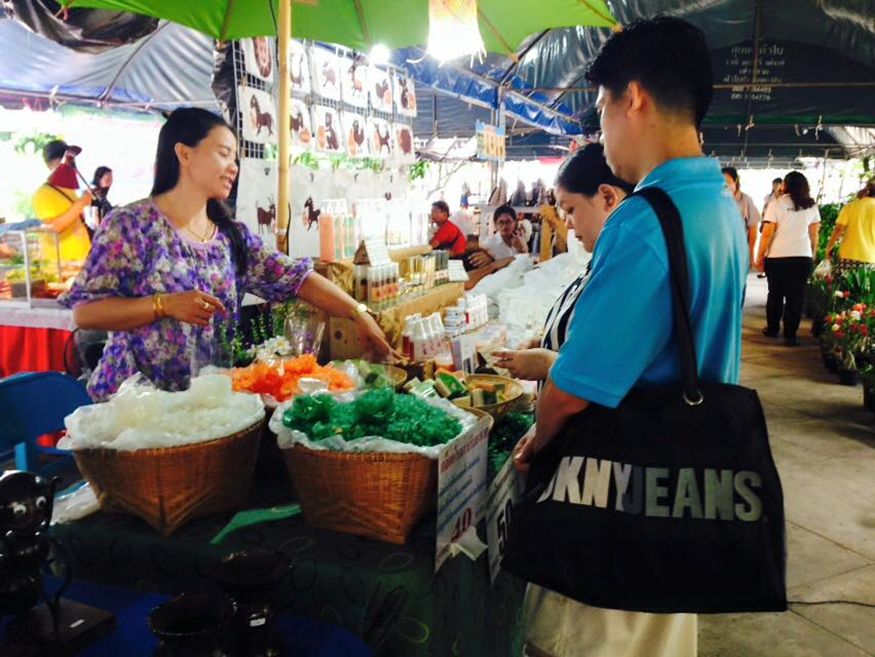
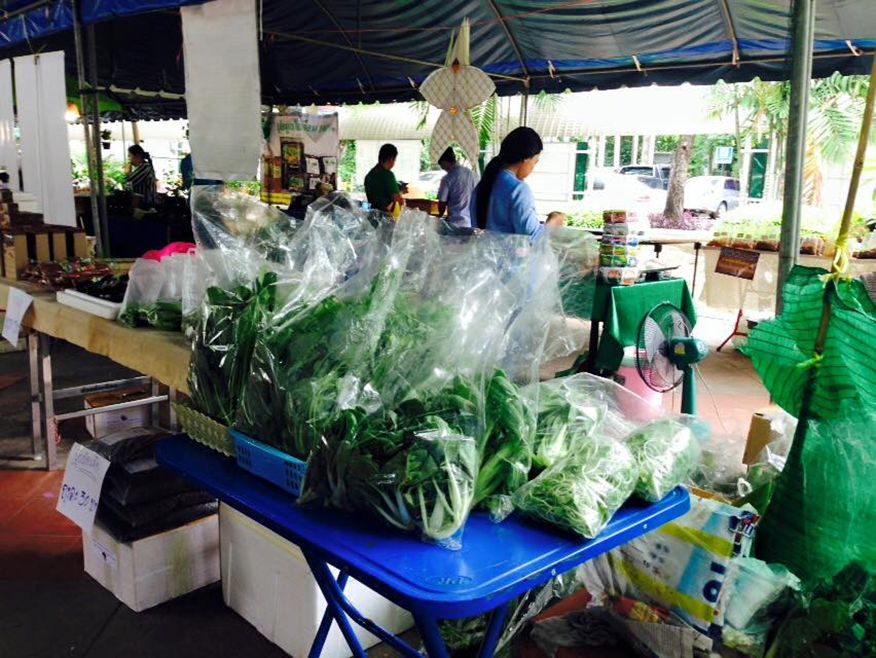
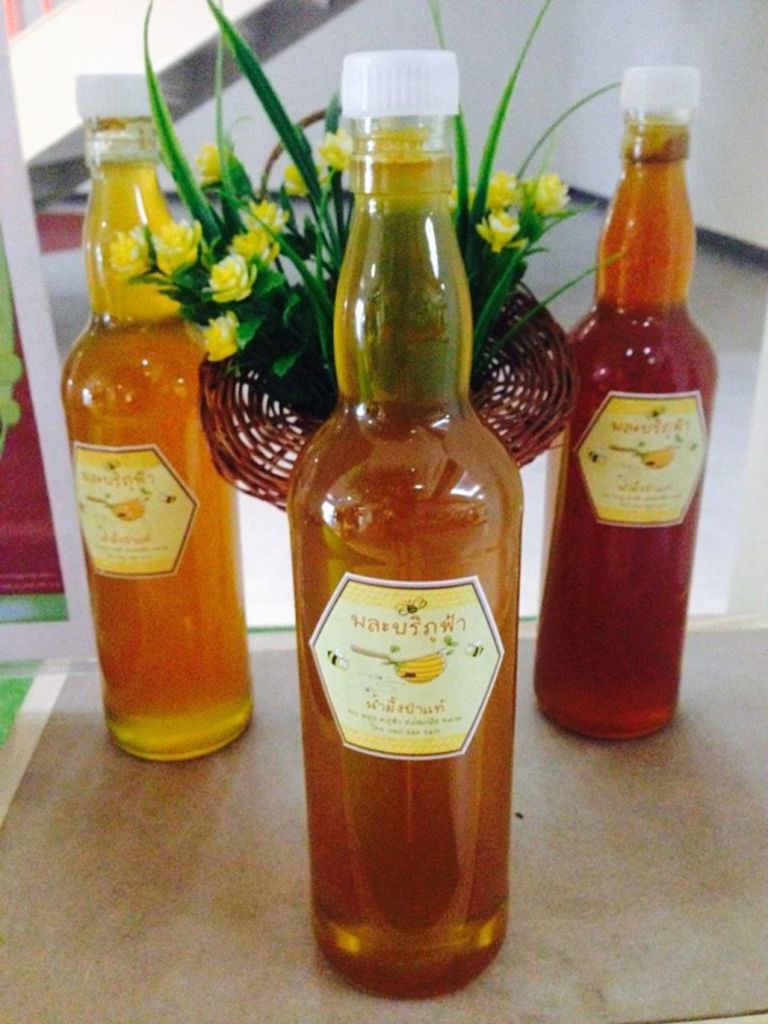
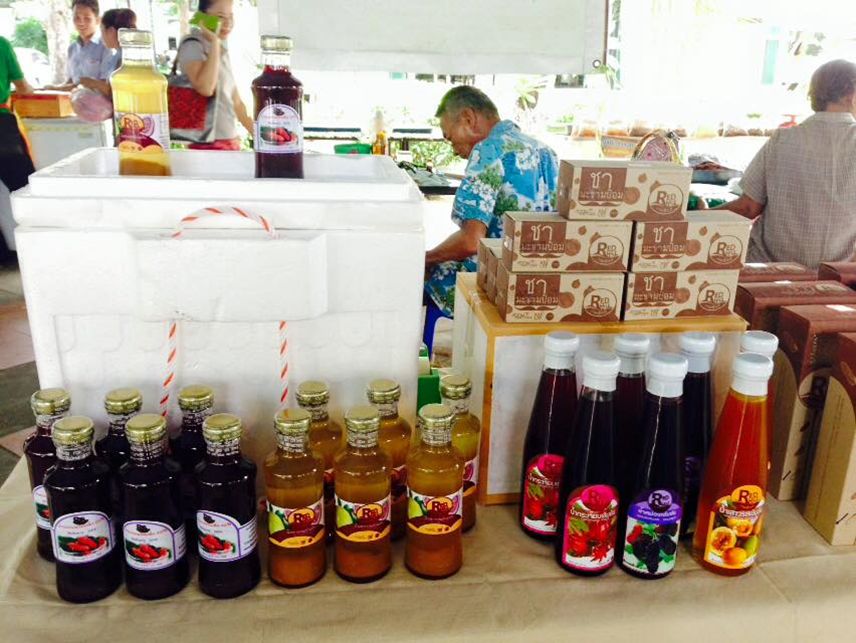
Additional evidence link:
1.https://www.facebook.com/FundraisingKMUTT/?tn=kCH-R&eid=ARB1TwvkwOIeCGY2KUgCaCcdBb3KK4nCMS_4FR8jbsqsIid
2.https://www.facebook.com/AlumniRelationsKmutt/?ref=search&tn=%2Cd%2CP-R&eid=ARCpXqxDArDn9ko1HzmmXdgizParCOYUbTeuBh7NZxIBTxGTB69M3Y1Wgp3fzR7l9eiLJnC779oJ5zoP



